Maggie James's Blog, page 17
July 29, 2015
Hoarding disorder: why I'm examining it in my latest book
By Maggie James
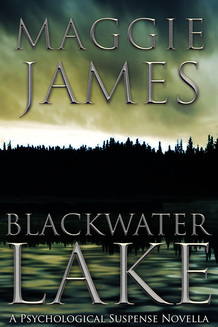 One of the themes for the book I'm currently writing, 'Blackwater Lake', is compulsive hoarding, otherwise known as hoarding disorder. I became interested after watching a documentary on the subject; unusual psychological conditions fascinate me. Not that I'm a hoarder myself. Anyone who's ever visited my flat will confirm I'm more of a minimalist! After giving away most of my possessions when I went travelling in 2010, I don't own a lot of things. I like it that way, so I'll be staying clutter-free.
One of the themes for the book I'm currently writing, 'Blackwater Lake', is compulsive hoarding, otherwise known as hoarding disorder. I became interested after watching a documentary on the subject; unusual psychological conditions fascinate me. Not that I'm a hoarder myself. Anyone who's ever visited my flat will confirm I'm more of a minimalist! After giving away most of my possessions when I went travelling in 2010, I don't own a lot of things. I like it that way, so I'll be staying clutter-free.
So what is hoarding disorder? The condition arises when someone acquires a large amount of items over time and stores them in a chaotic manner. The items are often of little or no monetary value and usually result in unmanageable amounts of clutter. Common items to hoard include newspapers and magazines, books, clothes, letters (including junk mail), containers such as cardboard boxes, and household supplies.
The resultant hoard can interfere with everyday living and pose a health hazard – some people are unable to use their kitchen or bathroom, and piles of junk can topple over and cause injuries. Sufferers can become agitated if someone tries to clear the mess and will insist the items have value. Often the clutter has a negative impact on the person's quality of life or their family's. Visitors to the house are discouraged and children of hoarders can be badly affected by not being able to invite friends home.
Hoarding disorders are difficult to treat, because many hoarders don't see it as a problem. Others feel ashamed, humiliated or guilty about it. The reasons for hoarding are complex. Sufferers may have had a deprived childhood, with either a lack of material objects or a poor relationship with close relatives. Sometimes there is a family history of hoarding or they've grown up in a cluttered home and see it as normal. Mental health problems associated with hoarding include depression, schizophrenia and obsessive compulsive disorder. Hoarding can also be a condition in itself, often linked to self-neglect.
How hoarding fits into 'Blackwater Lake'
After learning more about hoarding disorder, I decided to examine it in a future novel. I didn't want to base an entire book around it (although other authors have done so - see below) so I wove it into 'Blackwater Lake' as a subplot. Here's the synopsis:
Matthew Stanyer fears the worst when he reports his parents missing. Beset with worries about his wife, Evie, whose dementia is rapidly worsening, Joseph Stanyer has been struggling to cope. When the bodies of Matthew's parents are found at Blackwater Lake, a local beauty spot, the inquest rules the deaths as a murder-suicide. A conclusion that's supported by the note Joseph leaves for his son.
Grief-stricken, Matthew begins to clear his parents' house of decades of compulsive hoarding. And discovers the dark enigmas hidden within its clutter. Ones that lead Matthew to ask: why did his father choose Blackwater Lake to end his life? What other secrets do its waters conceal?
Hoarding is something I struggle to understand
 Photo courtesy of Shadwwulf at English WIkipediaI love to examine psychological issues in my books. 'Guilty Innocence' features obsessive-compulsive disorder, with Mark Slater finding comfort in counting rituals to relieve his anxiety. 'His Kidnapper's Shoes' examines cognitive dissonance, with Laura Bateman refusing to acknowledge that kidnapping Daniel Cordwell was a crime. I don't have OCD myself, but I understand how it provides comfort to sufferers. As for cognitive dissonance, I suspect we're all guilty of that to some extent at times!
Photo courtesy of Shadwwulf at English WIkipediaI love to examine psychological issues in my books. 'Guilty Innocence' features obsessive-compulsive disorder, with Mark Slater finding comfort in counting rituals to relieve his anxiety. 'His Kidnapper's Shoes' examines cognitive dissonance, with Laura Bateman refusing to acknowledge that kidnapping Daniel Cordwell was a crime. I don't have OCD myself, but I understand how it provides comfort to sufferers. As for cognitive dissonance, I suspect we're all guilty of that to some extent at times!
Hoarding disorder is more difficult for me to comprehend. I remember being baffled as I watched the TV programme when a man refused to throw away an old piece of foam. It was so ancient that it was crumbling to pieces yet to him it had value. For a non-hoarder like me, his resistance was hard to fathom.
I'm hoping that once I've completed my book I'll have a better understanding of the issue. In 'Blackwater Lake' both Joseph and Evie Stanyer are hoarders although the problem is worse for Evie. I can't reveal more without giving plot spoilers, though!
'Blackwater Lake' is currently undergoing revision and editing. Unlike my previous fiction titles, this one's a novella, and I estimate its length will be c.35,ooo words. (The average novel is 80,000 words long).
I'll be making 'Blackwater Lake' free across all sales platforms and from my website. You'll be able to download it without charge, whether via Amazon, Barnes and Noble, Apple or any of the other outlets I use. I don't have an exact publication date yet, but I hope to release 'Blackwater Lake' during August or September 2015.
Other novels that have featured hoarding disorder
It seems I'm not alone in finding hoarding disorder a source of inspiration. Here are three other novels that feature it:
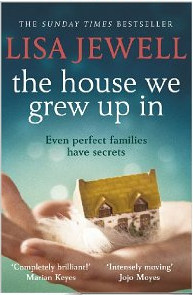
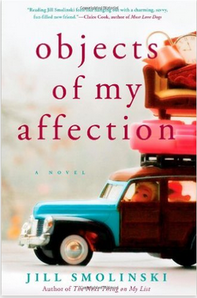
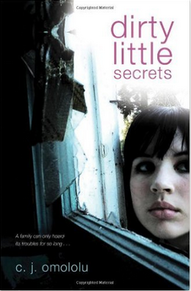 The Birds seem to be the perfect family: mother, father, four children, a picture-book cottage in the country.
The Birds seem to be the perfect family: mother, father, four children, a picture-book cottage in the country.
But when something happens one Easter weekend, it is so unexpected, so devastating, that no one can talk about it. The family shatters, seemingly for ever.
Until they are forced to return to the house they grew up in. And to confront what really took place all those years ago.
When Lucy Bloom is offered a high-paying gig helping clear the clutter from the home of reclusive and eccentric painter Marva Meier Rios, Lucy grabs it. Armed with the organizing expertise she gained while writing her book, 'Things Are Not People', and fueled by a burning desire to get her life back on track, Lucy rolls up her sleeves to take on the mess that fills every room of Marva's huge home. Lucy soon learns that the real challenge may be taking on Marva, who seems to love the objects in her home too much to let go of any of them.
Everyone has a secret. But Lucy’s is bigger and dirtier than most. It’s one she’s been hiding for years—that her mom’s out-of-control hoarding has turned their lives into a world of garbage and shame. She’s managed to keep her home life hidden from her best friend and her crush, knowing they’d be disgusted by the truth. So, when her mom dies suddenly in their home, Lucy hesitates to call 911 because revealing their way of life would make her future unbearable—and she begins her two-day plan to set her life right.Any comments about hoarding disorder?
Have you read any good novels that feature hoarding? Has hoarding been an issue for you or anyone you know? Is there any aspect of the condition you think I should incorporate into 'Blackwater Lake'? Leave a comment and let me know. There is still a lot of work to do on the book so I'm open to suggestions!
Enjoyed this post? Please share via the links below:
Why not subscribe to my blog?
 If you've enjoyed this post, how about subscribing to my blog via RSS feed or email? Either click the links in my blog sidebar or sign up via Networked Blogs, also in the sidebar. It'll be great to have you on board!
If you've enjoyed this post, how about subscribing to my blog via RSS feed or email? Either click the links in my blog sidebar or sign up via Networked Blogs, also in the sidebar. It'll be great to have you on board!
Get early bird discounts on my books!
 Want early bird discounts on my future releases, as well as information about special promotions and giveaways? Simply enter your details in the form at the top of the sidebar. I respect your privacy and will never sell your details to any third parties.
Want early bird discounts on my future releases, as well as information about special promotions and giveaways? Simply enter your details in the form at the top of the sidebar. I respect your privacy and will never sell your details to any third parties.
 One of the themes for the book I'm currently writing, 'Blackwater Lake', is compulsive hoarding, otherwise known as hoarding disorder. I became interested after watching a documentary on the subject; unusual psychological conditions fascinate me. Not that I'm a hoarder myself. Anyone who's ever visited my flat will confirm I'm more of a minimalist! After giving away most of my possessions when I went travelling in 2010, I don't own a lot of things. I like it that way, so I'll be staying clutter-free.
One of the themes for the book I'm currently writing, 'Blackwater Lake', is compulsive hoarding, otherwise known as hoarding disorder. I became interested after watching a documentary on the subject; unusual psychological conditions fascinate me. Not that I'm a hoarder myself. Anyone who's ever visited my flat will confirm I'm more of a minimalist! After giving away most of my possessions when I went travelling in 2010, I don't own a lot of things. I like it that way, so I'll be staying clutter-free.So what is hoarding disorder? The condition arises when someone acquires a large amount of items over time and stores them in a chaotic manner. The items are often of little or no monetary value and usually result in unmanageable amounts of clutter. Common items to hoard include newspapers and magazines, books, clothes, letters (including junk mail), containers such as cardboard boxes, and household supplies.
The resultant hoard can interfere with everyday living and pose a health hazard – some people are unable to use their kitchen or bathroom, and piles of junk can topple over and cause injuries. Sufferers can become agitated if someone tries to clear the mess and will insist the items have value. Often the clutter has a negative impact on the person's quality of life or their family's. Visitors to the house are discouraged and children of hoarders can be badly affected by not being able to invite friends home.
Hoarding disorders are difficult to treat, because many hoarders don't see it as a problem. Others feel ashamed, humiliated or guilty about it. The reasons for hoarding are complex. Sufferers may have had a deprived childhood, with either a lack of material objects or a poor relationship with close relatives. Sometimes there is a family history of hoarding or they've grown up in a cluttered home and see it as normal. Mental health problems associated with hoarding include depression, schizophrenia and obsessive compulsive disorder. Hoarding can also be a condition in itself, often linked to self-neglect.
How hoarding fits into 'Blackwater Lake'
After learning more about hoarding disorder, I decided to examine it in a future novel. I didn't want to base an entire book around it (although other authors have done so - see below) so I wove it into 'Blackwater Lake' as a subplot. Here's the synopsis:
Matthew Stanyer fears the worst when he reports his parents missing. Beset with worries about his wife, Evie, whose dementia is rapidly worsening, Joseph Stanyer has been struggling to cope. When the bodies of Matthew's parents are found at Blackwater Lake, a local beauty spot, the inquest rules the deaths as a murder-suicide. A conclusion that's supported by the note Joseph leaves for his son.
Grief-stricken, Matthew begins to clear his parents' house of decades of compulsive hoarding. And discovers the dark enigmas hidden within its clutter. Ones that lead Matthew to ask: why did his father choose Blackwater Lake to end his life? What other secrets do its waters conceal?
Hoarding is something I struggle to understand
 Photo courtesy of Shadwwulf at English WIkipediaI love to examine psychological issues in my books. 'Guilty Innocence' features obsessive-compulsive disorder, with Mark Slater finding comfort in counting rituals to relieve his anxiety. 'His Kidnapper's Shoes' examines cognitive dissonance, with Laura Bateman refusing to acknowledge that kidnapping Daniel Cordwell was a crime. I don't have OCD myself, but I understand how it provides comfort to sufferers. As for cognitive dissonance, I suspect we're all guilty of that to some extent at times!
Photo courtesy of Shadwwulf at English WIkipediaI love to examine psychological issues in my books. 'Guilty Innocence' features obsessive-compulsive disorder, with Mark Slater finding comfort in counting rituals to relieve his anxiety. 'His Kidnapper's Shoes' examines cognitive dissonance, with Laura Bateman refusing to acknowledge that kidnapping Daniel Cordwell was a crime. I don't have OCD myself, but I understand how it provides comfort to sufferers. As for cognitive dissonance, I suspect we're all guilty of that to some extent at times!Hoarding disorder is more difficult for me to comprehend. I remember being baffled as I watched the TV programme when a man refused to throw away an old piece of foam. It was so ancient that it was crumbling to pieces yet to him it had value. For a non-hoarder like me, his resistance was hard to fathom.
I'm hoping that once I've completed my book I'll have a better understanding of the issue. In 'Blackwater Lake' both Joseph and Evie Stanyer are hoarders although the problem is worse for Evie. I can't reveal more without giving plot spoilers, though!
'Blackwater Lake' is currently undergoing revision and editing. Unlike my previous fiction titles, this one's a novella, and I estimate its length will be c.35,ooo words. (The average novel is 80,000 words long).
I'll be making 'Blackwater Lake' free across all sales platforms and from my website. You'll be able to download it without charge, whether via Amazon, Barnes and Noble, Apple or any of the other outlets I use. I don't have an exact publication date yet, but I hope to release 'Blackwater Lake' during August or September 2015.
Other novels that have featured hoarding disorder
It seems I'm not alone in finding hoarding disorder a source of inspiration. Here are three other novels that feature it:


 The Birds seem to be the perfect family: mother, father, four children, a picture-book cottage in the country.
The Birds seem to be the perfect family: mother, father, four children, a picture-book cottage in the country.But when something happens one Easter weekend, it is so unexpected, so devastating, that no one can talk about it. The family shatters, seemingly for ever.
Until they are forced to return to the house they grew up in. And to confront what really took place all those years ago.
When Lucy Bloom is offered a high-paying gig helping clear the clutter from the home of reclusive and eccentric painter Marva Meier Rios, Lucy grabs it. Armed with the organizing expertise she gained while writing her book, 'Things Are Not People', and fueled by a burning desire to get her life back on track, Lucy rolls up her sleeves to take on the mess that fills every room of Marva's huge home. Lucy soon learns that the real challenge may be taking on Marva, who seems to love the objects in her home too much to let go of any of them.
Everyone has a secret. But Lucy’s is bigger and dirtier than most. It’s one she’s been hiding for years—that her mom’s out-of-control hoarding has turned their lives into a world of garbage and shame. She’s managed to keep her home life hidden from her best friend and her crush, knowing they’d be disgusted by the truth. So, when her mom dies suddenly in their home, Lucy hesitates to call 911 because revealing their way of life would make her future unbearable—and she begins her two-day plan to set her life right.Any comments about hoarding disorder?
Have you read any good novels that feature hoarding? Has hoarding been an issue for you or anyone you know? Is there any aspect of the condition you think I should incorporate into 'Blackwater Lake'? Leave a comment and let me know. There is still a lot of work to do on the book so I'm open to suggestions!
Enjoyed this post? Please share via the links below:
Why not subscribe to my blog?
 If you've enjoyed this post, how about subscribing to my blog via RSS feed or email? Either click the links in my blog sidebar or sign up via Networked Blogs, also in the sidebar. It'll be great to have you on board!
If you've enjoyed this post, how about subscribing to my blog via RSS feed or email? Either click the links in my blog sidebar or sign up via Networked Blogs, also in the sidebar. It'll be great to have you on board!Get early bird discounts on my books!
 Want early bird discounts on my future releases, as well as information about special promotions and giveaways? Simply enter your details in the form at the top of the sidebar. I respect your privacy and will never sell your details to any third parties.
Want early bird discounts on my future releases, as well as information about special promotions and giveaways? Simply enter your details in the form at the top of the sidebar. I respect your privacy and will never sell your details to any third parties.
Published on July 29, 2015 02:24
July 22, 2015
Where have all the ghosts gone?
Guest post by J. D. Barker
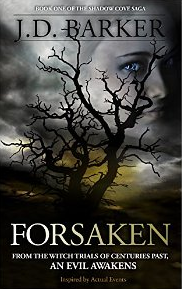 Forsaken by J D BarkerI'm delighted to welcome American horror novelist J. D. Barker to my blog today. J.D has written a powerful post about the power of the imagination. Take it away, J.D!
Forsaken by J D BarkerI'm delighted to welcome American horror novelist J. D. Barker to my blog today. J.D has written a powerful post about the power of the imagination. Take it away, J.D!
It’s 3AM on a Thursday morning and I’m alone in my office. My wife is sound asleep upstairs, the dogs are snoring (rather loudly) in their beds, and I find myself parked at my keyboard squeezing three pages of my latest novel from my fingertips. The house seems so different at this early hour, without the voices and sound of little feet. I can hear the grandfather clock faithfully ticking away in the other room, the crickets outside, the wind as it moans its way through the trees in search of some far off destination. The world is black, the world is resting, but something still stirs.
I had been woken by a voice, a single voice whispering at my ear. She was one of my characters and she desperately wanted to tell me what comes next in the tale I’ve been weaving of late; a haunted house story unlike any other. I turned over and tried to block her out but they can be rather insistent when they come to me like this and I eventually found myself crawling from bed and down the stairs to my office. It wasn’t until I wrote her words that she fell silent.
She’ll be back.
They always come back.
The clock in the corner of my office chimes the hour, three minutes late I note.
My office is filled with little trinkets.
There is an antique globe on a stand in the corner, a chest at my side filled with pages of stories past, an intricately carved pocket watch hanging from the lamp beside me. Yesterday a friend had stopped by and picked up that watch, commented on just how “cool” it was, then set it back down before asking me if I wanted to be in his fantasy football league come August. Before I could respond, he received a call from his wife, something about a problem at work and can he pick up their daughter from softball, then he was gone.
After he left, I picked up that same watch, wound it, and watched the hands move across the dial, catching the light just so. I then opened a file on my computer and browsed through the sixty odd pages I had written about that very watch, the start of another novel.
I couldn’t help but wonder how one man can look at an item and dismiss it, while another sees a history, a story waiting to be told.
As children, any one of my friends could have picked up that watch and transformed it into a time machine, a communication device, the key to a futuristic vehicle made up of our swing set and some pieces of wood strategically placed to draw a hull and door in the earth at our feet.
I rolled it between my fingers.
If the hands were to turn backwards, could we bring back the dead?
Just when do we lose the ability to imagine?
When I was a child, we lived in a grand English Tudor built by my father in the middle of a forest of oaks. Shortly after moving in, our friends began to tell my sister and I about the ghost of a woman sometimes seen wandering through the same forest where our house now stood. They told us she had been around for decades and nobody knew why her spirit remained or who she was. They knew enough to be frightened, they also knew enough to be curious.
On my eighth birthday, I had a party and a number of children stayed the night, a campout in our basement. As midnight approached and a hardy game of Truth or Dare was played, I eventually took a dare (only after an exhaustive triplet of truths) and David Spivey looked up at me with a flashlight held at his chin. “I dare you to walk to the center of the woods tonight at midnight, alone.”
The room fell silent as the weight of such a dare fell on everyone. Heidi Orgler shook her head and quickly told me I didn’t have to do it (yes, at eight, slumber parties were still co-ed) but I knew I did. Most of these kids had grown up together but my sister and I had only moved there a few years earlier, we were still outsiders in their eyes and I knew such a dare would help me check off another box on the entry form for that local club. I had to do it and do it I did.
As midnight neared, I stood and the others followed. I ascended the back stairs and opened a door on the night, all of us moving with stealth as to not wake our parents one floor up. They remained and I went, telling myself I was shivering from cold and not fear.
One day I may tell you what I saw that night but today is not that day for that is not the point of this article. I will tell you the things I saw followed me back out and continue to work their way into all my writing and that is the point.
Is that why I write the things I do?
If I had made that same journey as an adult, would I have been just as scared?
Would it still be ghosts, wolves, and things that bump in the night like when I was a child or would I have been watching for homeless people camping behind the trees? Would the idea of being mugged prove a more frightening prospect to an adult than a mysterious ghost?
These childhood experiences do shape us, they do stick with us.
As an adult, I traveled back to my childhood home and stared off into those woods, I peered hard into the trees, my eyes searching for her, just a glimpse of her. I didn’t see anything but then it dawned on me… I still looked. And I couldn’t help but smile.
I think as long as we find ourselves searching the woods for ghosts, that part of our childhood will live on. Our imagination will continue to thrive, the characters will still wake us in the middle of the night to tell their tale.
When was the last time you went in search of a ghost?
Perhaps everyone should.
More about J. D. Barker
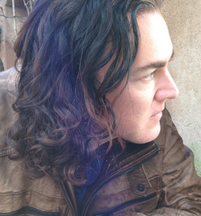 Novelist J D BarkerJ.D. Barker is the international bestselling author of Forsaken (Hampton Creek Press, 2014) - a finalist for the Bram Stoker Award for Superior Achievement in a Debut Novel. The expertly crafted tale twists both past and present into a fast-paced, suspenseful ride which has earned him comparisons to Stephen King, Dean Koontz, and John Saul.
Novelist J D BarkerJ.D. Barker is the international bestselling author of Forsaken (Hampton Creek Press, 2014) - a finalist for the Bram Stoker Award for Superior Achievement in a Debut Novel. The expertly crafted tale twists both past and present into a fast-paced, suspenseful ride which has earned him comparisons to Stephen King, Dean Koontz, and John Saul.
His latest novel, The Fourth Monkey, is set to release early in 2016. In addition, he has been asked to co-author a prequel to Dracula by the Stoker family. Barker splits his time between Englewood, FL, and Pittsburgh, PA, with his wife, Dayna.
You can find out more at www.masterofsuspense.com.
Enjoyed this post? Please share via the links below:
Why not sign up to my blog?
If you've enjoyed this post, how about subscribing to my blog via RSS feed or email? Either click the links in my blog sidebar or sign up via Networked Blogs, also in the sidebar. It'll be great to have you on board!
Get early bird discounts on my books!
 Want early bird discounts on my future releases, as well as information about special promotions and giveaways? Simply enter your details in the form at the top of the sidebar. I respect your privacy and will never sell your details to any third parties.
Want early bird discounts on my future releases, as well as information about special promotions and giveaways? Simply enter your details in the form at the top of the sidebar. I respect your privacy and will never sell your details to any third parties.
 Forsaken by J D BarkerI'm delighted to welcome American horror novelist J. D. Barker to my blog today. J.D has written a powerful post about the power of the imagination. Take it away, J.D!
Forsaken by J D BarkerI'm delighted to welcome American horror novelist J. D. Barker to my blog today. J.D has written a powerful post about the power of the imagination. Take it away, J.D!It’s 3AM on a Thursday morning and I’m alone in my office. My wife is sound asleep upstairs, the dogs are snoring (rather loudly) in their beds, and I find myself parked at my keyboard squeezing three pages of my latest novel from my fingertips. The house seems so different at this early hour, without the voices and sound of little feet. I can hear the grandfather clock faithfully ticking away in the other room, the crickets outside, the wind as it moans its way through the trees in search of some far off destination. The world is black, the world is resting, but something still stirs.
I had been woken by a voice, a single voice whispering at my ear. She was one of my characters and she desperately wanted to tell me what comes next in the tale I’ve been weaving of late; a haunted house story unlike any other. I turned over and tried to block her out but they can be rather insistent when they come to me like this and I eventually found myself crawling from bed and down the stairs to my office. It wasn’t until I wrote her words that she fell silent.
She’ll be back.
They always come back.
The clock in the corner of my office chimes the hour, three minutes late I note.
My office is filled with little trinkets.
There is an antique globe on a stand in the corner, a chest at my side filled with pages of stories past, an intricately carved pocket watch hanging from the lamp beside me. Yesterday a friend had stopped by and picked up that watch, commented on just how “cool” it was, then set it back down before asking me if I wanted to be in his fantasy football league come August. Before I could respond, he received a call from his wife, something about a problem at work and can he pick up their daughter from softball, then he was gone.
After he left, I picked up that same watch, wound it, and watched the hands move across the dial, catching the light just so. I then opened a file on my computer and browsed through the sixty odd pages I had written about that very watch, the start of another novel.
I couldn’t help but wonder how one man can look at an item and dismiss it, while another sees a history, a story waiting to be told.
As children, any one of my friends could have picked up that watch and transformed it into a time machine, a communication device, the key to a futuristic vehicle made up of our swing set and some pieces of wood strategically placed to draw a hull and door in the earth at our feet.
I rolled it between my fingers.
If the hands were to turn backwards, could we bring back the dead?
Just when do we lose the ability to imagine?
When I was a child, we lived in a grand English Tudor built by my father in the middle of a forest of oaks. Shortly after moving in, our friends began to tell my sister and I about the ghost of a woman sometimes seen wandering through the same forest where our house now stood. They told us she had been around for decades and nobody knew why her spirit remained or who she was. They knew enough to be frightened, they also knew enough to be curious.
On my eighth birthday, I had a party and a number of children stayed the night, a campout in our basement. As midnight approached and a hardy game of Truth or Dare was played, I eventually took a dare (only after an exhaustive triplet of truths) and David Spivey looked up at me with a flashlight held at his chin. “I dare you to walk to the center of the woods tonight at midnight, alone.”
The room fell silent as the weight of such a dare fell on everyone. Heidi Orgler shook her head and quickly told me I didn’t have to do it (yes, at eight, slumber parties were still co-ed) but I knew I did. Most of these kids had grown up together but my sister and I had only moved there a few years earlier, we were still outsiders in their eyes and I knew such a dare would help me check off another box on the entry form for that local club. I had to do it and do it I did.
As midnight neared, I stood and the others followed. I ascended the back stairs and opened a door on the night, all of us moving with stealth as to not wake our parents one floor up. They remained and I went, telling myself I was shivering from cold and not fear.
One day I may tell you what I saw that night but today is not that day for that is not the point of this article. I will tell you the things I saw followed me back out and continue to work their way into all my writing and that is the point.
Is that why I write the things I do?
If I had made that same journey as an adult, would I have been just as scared?
Would it still be ghosts, wolves, and things that bump in the night like when I was a child or would I have been watching for homeless people camping behind the trees? Would the idea of being mugged prove a more frightening prospect to an adult than a mysterious ghost?
These childhood experiences do shape us, they do stick with us.
As an adult, I traveled back to my childhood home and stared off into those woods, I peered hard into the trees, my eyes searching for her, just a glimpse of her. I didn’t see anything but then it dawned on me… I still looked. And I couldn’t help but smile.
I think as long as we find ourselves searching the woods for ghosts, that part of our childhood will live on. Our imagination will continue to thrive, the characters will still wake us in the middle of the night to tell their tale.
When was the last time you went in search of a ghost?
Perhaps everyone should.
More about J. D. Barker
 Novelist J D BarkerJ.D. Barker is the international bestselling author of Forsaken (Hampton Creek Press, 2014) - a finalist for the Bram Stoker Award for Superior Achievement in a Debut Novel. The expertly crafted tale twists both past and present into a fast-paced, suspenseful ride which has earned him comparisons to Stephen King, Dean Koontz, and John Saul.
Novelist J D BarkerJ.D. Barker is the international bestselling author of Forsaken (Hampton Creek Press, 2014) - a finalist for the Bram Stoker Award for Superior Achievement in a Debut Novel. The expertly crafted tale twists both past and present into a fast-paced, suspenseful ride which has earned him comparisons to Stephen King, Dean Koontz, and John Saul.His latest novel, The Fourth Monkey, is set to release early in 2016. In addition, he has been asked to co-author a prequel to Dracula by the Stoker family. Barker splits his time between Englewood, FL, and Pittsburgh, PA, with his wife, Dayna.
You can find out more at www.masterofsuspense.com.
Enjoyed this post? Please share via the links below:
Why not sign up to my blog?
If you've enjoyed this post, how about subscribing to my blog via RSS feed or email? Either click the links in my blog sidebar or sign up via Networked Blogs, also in the sidebar. It'll be great to have you on board!
Get early bird discounts on my books!
 Want early bird discounts on my future releases, as well as information about special promotions and giveaways? Simply enter your details in the form at the top of the sidebar. I respect your privacy and will never sell your details to any third parties.
Want early bird discounts on my future releases, as well as information about special promotions and giveaways? Simply enter your details in the form at the top of the sidebar. I respect your privacy and will never sell your details to any third parties.
Published on July 22, 2015 00:20
July 15, 2015
Coming soon - my latest fiction title, Blackwater Lake!
By Maggie James
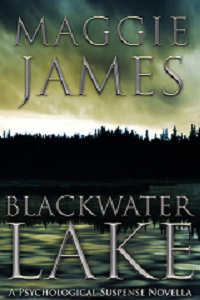 I'm delighted to report that my latest book, Blackwater Lake, is now well under way. Unlike my previous fiction titles, this one's a novella, and I estimate its length will be 35 - 40, ooo words. (The average novel is 80,000 words long). As of today, I've written 22,382 (yes, I keep count!) and I aim to finish the first draft during the week commencing July 20, 2015. Then the hard work of revising and editing will begin. Unlike many authors, I love that part!
I'm delighted to report that my latest book, Blackwater Lake, is now well under way. Unlike my previous fiction titles, this one's a novella, and I estimate its length will be 35 - 40, ooo words. (The average novel is 80,000 words long). As of today, I've written 22,382 (yes, I keep count!) and I aim to finish the first draft during the week commencing July 20, 2015. Then the hard work of revising and editing will begin. Unlike many authors, I love that part!
In keeping with the psychological suspense themes I love, Blackwater Lake centres around a murder-suicide. Here's a synopsis of the plot:
Matthew Stanyer fears the worst when he reports his parents missing. Beset with worries about his wife, Evie, whose dementia is rapidly worsening, Joseph Stanyer has been struggling to cope. When the bodies of Matthew's parents are found close to Blackwater Lake, a local beauty spot, the inquest rules the deaths as a murder-suicide. A conclusion that's supported by the note Joseph leaves for his son. Grief-stricken, Matthew begins to clear his parents' house of two decades of compulsive hoarding. And discovers the dark enigmas hidden within. Ones that lead Matthew to ask: why did his father choose Blackwater Lake to end his life? What other secrets do its waters conceal?
I'll be making Blackwater Lake free across all sales platforms and from this site. You'll be able to download it without charge, whether via Amazon, Barnes and Noble, Apple or any of the other outlets I use. I don't have an exact publication date yet, but I aim to release Blackwater Lake during August 2015. I'll keep you posted!
Enjoyed this post? Please share via the links below:
Why not subscribe to my blog?
 If you've enjoyed this post, how about subscribing to my blog via RSS feed or email? Either click the links in my blog sidebar or sign up via Networked Blogs, also in the sidebar. It'll be great to have you on board!
If you've enjoyed this post, how about subscribing to my blog via RSS feed or email? Either click the links in my blog sidebar or sign up via Networked Blogs, also in the sidebar. It'll be great to have you on board!
Get early bird discounts on my books!
 Want early bird discounts on my future releases, as well as information about special promotions and giveaways? Simply enter your details in the form at the top of the sidebar. I respect your privacy and will never sell your details to any third parties.
Want early bird discounts on my future releases, as well as information about special promotions and giveaways? Simply enter your details in the form at the top of the sidebar. I respect your privacy and will never sell your details to any third parties.
 I'm delighted to report that my latest book, Blackwater Lake, is now well under way. Unlike my previous fiction titles, this one's a novella, and I estimate its length will be 35 - 40, ooo words. (The average novel is 80,000 words long). As of today, I've written 22,382 (yes, I keep count!) and I aim to finish the first draft during the week commencing July 20, 2015. Then the hard work of revising and editing will begin. Unlike many authors, I love that part!
I'm delighted to report that my latest book, Blackwater Lake, is now well under way. Unlike my previous fiction titles, this one's a novella, and I estimate its length will be 35 - 40, ooo words. (The average novel is 80,000 words long). As of today, I've written 22,382 (yes, I keep count!) and I aim to finish the first draft during the week commencing July 20, 2015. Then the hard work of revising and editing will begin. Unlike many authors, I love that part!In keeping with the psychological suspense themes I love, Blackwater Lake centres around a murder-suicide. Here's a synopsis of the plot:
Matthew Stanyer fears the worst when he reports his parents missing. Beset with worries about his wife, Evie, whose dementia is rapidly worsening, Joseph Stanyer has been struggling to cope. When the bodies of Matthew's parents are found close to Blackwater Lake, a local beauty spot, the inquest rules the deaths as a murder-suicide. A conclusion that's supported by the note Joseph leaves for his son. Grief-stricken, Matthew begins to clear his parents' house of two decades of compulsive hoarding. And discovers the dark enigmas hidden within. Ones that lead Matthew to ask: why did his father choose Blackwater Lake to end his life? What other secrets do its waters conceal?
I'll be making Blackwater Lake free across all sales platforms and from this site. You'll be able to download it without charge, whether via Amazon, Barnes and Noble, Apple or any of the other outlets I use. I don't have an exact publication date yet, but I aim to release Blackwater Lake during August 2015. I'll keep you posted!
Enjoyed this post? Please share via the links below:
Why not subscribe to my blog?
 If you've enjoyed this post, how about subscribing to my blog via RSS feed or email? Either click the links in my blog sidebar or sign up via Networked Blogs, also in the sidebar. It'll be great to have you on board!
If you've enjoyed this post, how about subscribing to my blog via RSS feed or email? Either click the links in my blog sidebar or sign up via Networked Blogs, also in the sidebar. It'll be great to have you on board!Get early bird discounts on my books!
 Want early bird discounts on my future releases, as well as information about special promotions and giveaways? Simply enter your details in the form at the top of the sidebar. I respect your privacy and will never sell your details to any third parties.
Want early bird discounts on my future releases, as well as information about special promotions and giveaways? Simply enter your details in the form at the top of the sidebar. I respect your privacy and will never sell your details to any third parties.
Published on July 15, 2015 07:01
July 1, 2015
Finding time to write in a busy schedule
by Maggie James
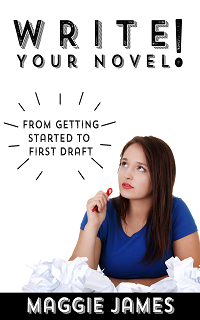 Click the image to buy from Amazon!My book for aspiring novelists, Write Your Novel! From Getting Started to First Draft, has now been published and is available from Amazon in Kindle format via this link. The book includes a chapter on how people can carve out time to write from their busy schedules. The tips can, of course, be adapted to fit anything you'd like to make room for, whether it's reading more books, exercising or meditating.
Click the image to buy from Amazon!My book for aspiring novelists, Write Your Novel! From Getting Started to First Draft, has now been published and is available from Amazon in Kindle format via this link. The book includes a chapter on how people can carve out time to write from their busy schedules. The tips can, of course, be adapted to fit anything you'd like to make room for, whether it's reading more books, exercising or meditating.
So whether you're a would-be novelist or someone who'd like to claw back some time from their day, I hope you enjoy this blog post. I'm going to reproduce here most of the chapter on finding time from my book. Here goes!
How to fit writing into a busy life
Let's tackle the thorny issue of time, which many people cite as their reason for not writing a novel. It's one I understand. When I worked as an accountant, I got up at 6am, went to the gym and started work by 8.30am. Once home, I had to cook my evening meal and afterwards there were always a thousand things to do. I persuaded myself a balanced life was necessary, that I needed to socialise or relax with a book or by watching television. Time to write a novel seemed an impossibility.
I was wrong. Isn't it fascinating how our minds can blinker us to the truth? I was overlooking several key factors. I didn't work at weekends. I spent hours in Internet forums and on Facebook. Had I examined those two elements, I'd have found plenty of time to write.
Take my Internet addiction. Easy to prune an hour each day from that, given most of it was mindless. Now let's turn to the weekends. I could have spared the afternoons - say three hours at a stretch. That's five hours reclaimed during the week, plus six at the weekends. I'm a snail's pace typist, but even I can churn out 1,800 words hourly. Had I organised myself better, that would be 20,000 words per week. Meaning I could complete the first draft of a novel in five weeks.
Those figures make me wonder why the penny didn't drop sooner. I think I had a fixed idea that writing a novel meant getting up earlier to create the time, and, as a night owl, I considered 6am early enough.
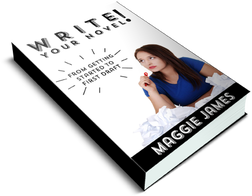 Little and often wins the race
Little and often wins the race
I also overlooked how small and regular stints are better than huge but sporadic efforts. Better to write daily for an hour than for ten hours, then burn out with exhaustion. The latter will persuade you that writing isn't your thing; you'll give up on your dream and maybe damage your health. Don't let that happen. Besides building your novel scene by scene, a consistent writing habit promotes self-discipline, which you can carry over into other areas of your life. A bonus!
Maybe you can spare fifteen minutes during your lunch break, another half an hour in the evenings, but nothing at weekends. That’s forty-five minutes five days a week. In that time, you could achieve 1,300 words daily, 6,500 weekly. Three to four months later you'll have written your novel. Little and often adds up, doesn't it?
Plan and schedule your time in advance, at least for the coming week. Set yourself goals for what day you’ll begin, when to do your research, how many words you'll write each day. Give yourself a proposed finishing date and check it's realistic. Schedule every stage of your novel. If time for your book is allocated in your diary or online calendar, it's more likely to get done. Jim Rohn, a well-known motivational speaker, has a phrase I love - ‘schedule your success.’
What's the secret?
Commitment. It needn't be daunting, although many people dislike the word. If you're one of them, set your writing goals at a modest level, no matter how much time you have available. Commit to 350 words per day, which doesn't take long. You can find half an hour in your day from somewhere. Consider your typical day, both at weekends and during the week. Could you get up earlier? Can you cut down on Internet usage, checking emails, or updating your Facebook status? What about using your lunchtimes at work? Less television in the evenings?
Some people revamp their working life to allow them more opportunity to write. That may not be achievable for many of you, although it worked for Ruth.
‘I switched my daily hours to the afternoon and evening so the morning is available in which to write,’ she told me. ‘I'm a lark, so I'm more creative then. My novel has come on in leaps and bounds!’
 Chunks of time
Chunks of time
If it’s feasible for you, writing for longer periods has its advantages. You immerse yourself in your story in a way that writing for half an hour doesn’t permit. Besides, you’ll find that once you get going you won’t want to stop. Your characters will take over, demanding expression, and when you’re in full flow, you’ll lose track of everything except what’s pouring from your imagination. If you can, schedule at least one session each week that’s an hour, preferably two, long. That’s enough time to visualise the action and characters, turn on your creative juices and write a couple of thousand words.
For those who work full-time, if you can manage an hour on each of Saturday and Sunday, you could bang out 4,000 words per week. In less than six months, you'll have completed your book.
Real people, real lives - how to make it work
Let's look at a few examples. Take Tom, a novelist friend of mine. He works full-time and has a wife and family. He commutes to his office job every day, battling traffic. Once he's home in the evenings, he's drained from the concentration his work requires. On weekends, he spends time with his family, along with pursuing his other interests in life, which include music, reading and hiking in the nearby mountains.
Sounds familiar? What I've described is the norm for most people - busy, busy, busy! How is it possible to write with such a schedule? What Tom did was squeeze an extra hour into his day. Here’s how he managed it.
‘Each weekday morning, I leave home at around 6am, at which time there's little traffic on the roads,’ Tom says. ‘I drive to work and park my car, then walk for five minutes to a local cafe that opens early. I choose a table at the back, where there’s less noise, away from the coffee machines and the busy counter. I order espresso and toast, plug in my laptop, and work on my novel. Once I begin, I'm in the zone, in which the sounds of the cafe door and other patrons’ conversations don't even reach me. I'm lost in my fictional world, absorbed by my characters and the challenges they face.’
Tom uses the Pomodoro method for his writing stints, doing two twenty-five minute sessions with a five-minute break after each one. During that time, he orders more espresso, does a few neck and shoulder exercises, and recharges his mental batteries ready for his next stint. When he leaves the cafe at half-past seven, he's had breakfast and he's added 1,800 - 2,000 words to his novel. In a week that's 10,000 words, and he still has his weekends and evenings free for his family, hiking, music, etc. See how ‘little and often’ mounts up?
Here’s another example. Jodie is a busy single mother who works full-time. How does she slot writing into her hectic schedule?
‘I need to be very organised, very disciplined,’ she says. ‘Once I got into a routine, it was easy, as well as addictive. Writing's somewhat of a drug for me - if I don't get my daily fix, I feel off. The knowledge that I'm progressing towards a completed novel gives me an amazing high! I love seeing my book grow longer every day and the word count mount up. It's taken me two months so far and I estimate I'll finish the first draft within a few weeks.’
Here's Jodie's schedule:
5:30 – Get up and write. The twins are in bed and the house is quiet. During her morning writing session, she averages 700 words.
6:15 – Get kids out of bed. Prepare for work.
7:00 – Drop off children at their preschool breakfast club.
7:15 – Commute to employment.
8:00 – Morning at work.
12:00 – Sandwich for lunch. Then she walks in a nearby park. The fresh air clears her mind, ready for the afternoon. During this time, she plans more of her novel in her head.
1:00 – Work again.
4:00 – Leave for the commute home. Buy groceries on the way. Pick up children from Ella’s house. (Jodie’s friend Ella collects them from school along with her own daughter.)
5:45 – Make dinner.
6:30 – Family time. Jodie listens to her children talk about their day, making herself available for whatever they need, as well as loading the washing machine, etc.
8:30 – Put the twins to bed.
9:00 – Writing. The house is quiet again and she manages another 1,300 words. ‘My hourly rate is lower because I'm winding down,’ Jodie says.
10:00 – Pack tomorrow’s lunches.
10:30 – Go to bed.
Through planning and self-discipline, Jodie manages an average of 2,000 words per day during the week. She doesn't write on weekends, preferring to be with her children, catch up with housework and visit her parents. She's still adding 10,000 words a week to her romance novel, however. When we spoke she was at the 80,000-word mark and thrilled at the prospect of finishing her first draft.
‘The strange thing is, it's given me more energy,’ she says. ‘Before I started ‘What the Heart Wants’, I was dubious whether I'd find the mental reserves to write a novel, let alone the time. I have five-year-old twins and a job. But I was wrong. The joy of writing, after so many years when it was just a cherished dream, has infused me with passion, which rubs off onto the rest of my life. I’m not perfect. The house is a mess, I don’t see enough of my friends or exercise as much as I should. But I’m writing my novel at last.’
 Photo credit: WikipediaOther tips and tricks? Read these examples
Photo credit: WikipediaOther tips and tricks? Read these examples
Mindy: ‘I use voice recognition software because I'm a terrible typist. It's much quicker than typing - I'm told we speak three times faster than we can type. Works for me! I dictate my novel whenever I can - in the car on the way to the office or walking during my lunch hour. It's not ideal, as the microphone picks up any extra sounds, but today I managed 2,000 words.’
Louie: ‘What I did was get Dropbox on my phone and computer and sync them. Then I pump out a few sentences here and there on my phone during the day. At work, I often wait for meetings to start or for downloads to complete. I use that time to write more of my book. Most days I squeeze in 300 words. Over a month, that's 6,000 words.’
Susie uses a similar method, writing as and when she can: ‘My iPad goes everywhere with me, along with a Bluetooth keyboard. My daily schedule is irregular, making writing on a consistent basis difficult during the working week. It's amazing how much I add to my novel each day.’
Michael says he works long hours, often arriving home exhausted at ten pm. He also uses the ‘little and often’ method. Sometimes he only manages a few sentences a day via his tablet, but he loves the knowledge that no matter how hectic his job is, he's still making his dream a reality. In addition, his writing buddies spur him on. ‘I need accountability; it helps me stay on track,’ he says. ‘I'm a member of a writing group that meets every Saturday morning at a local coffee shop. We compare notes on our progress, then we knuckle down to writing, fuelled by cappuccinos. We write for two hours, then discuss our word count. I'm fiercely competitive, which spurs me on. I manage to write for another hour at home on Sundays. In three hours each weekend, plus whatever I rack up between Monday and Friday, I average 5,000 words per week.’
Like Michael, Amelia is competitive and she uses that to her advantage: ‘I joined an online group where people write in sprints and report back how many words they achieved in a half-hour time slot. The challenge really motivates me.’
Devon: ‘What's worked for me is ditching TV. We still own a television because my wife won't hear of giving it up - yet. She's coming round to the idea, though. She's seen me make real progress on my horror novel and commit to an exercise routine once I refused to get drawn into the latest TV drama. I'm now halfway through writing my first book. I couldn't be more pleased.’
Sam: ‘I'm super strict with myself over using the Internet. I've disciplined myself to check my emails and Facebook on the fly via my smartphone, but never at home. During my writing time, I unplug from the Internet and switch off my phone. Before I started this practice, I was only managing 500 words a day, thanks to the temptation to hang out on Facebook. Nowadays I rarely do less than 1,500 words. It's worked well for me.’
Action plan:
1. Read through the above examples again. When can you find time to write? Does it fit with when you're most alert and productive? Will it be free from distractions and interruptions?
2. Can you reduce your television and Internet time to make space for your novel? Write during your lunch break? Get up earlier? Go to bed later?
3. Do you own the tools you need to make use of short spells of downtime? Can you write on the fly using your smartphone? Is voice recognition software an option for your commute? Do you carry a notepad and pen or a tablet with you so you can make the most of train journeys?
4. Schedule next week’s writing sessions in your calendar. Block them out so the time’s unavailable for anything else.Enjoyed this post? Why not share via the links below:
Why not subscribe to my blog?
 If you've enjoyed this post, how about subscribing to my blog via RSS feed or email? Either click the links in my blog sidebar or sign up via Networked Blogs, also in the sidebar. It'll be great to have you on board!
If you've enjoyed this post, how about subscribing to my blog via RSS feed or email? Either click the links in my blog sidebar or sign up via Networked Blogs, also in the sidebar. It'll be great to have you on board!
Get early bird discounts on my books!
 Want early bird discounts on my future releases, as well as information about special promotions and giveaways? Simply enter your details in the form at the top of the sidebar. I respect your privacy and will never sell your details to any third parties.
Want early bird discounts on my future releases, as well as information about special promotions and giveaways? Simply enter your details in the form at the top of the sidebar. I respect your privacy and will never sell your details to any third parties.
 Click the image to buy from Amazon!My book for aspiring novelists, Write Your Novel! From Getting Started to First Draft, has now been published and is available from Amazon in Kindle format via this link. The book includes a chapter on how people can carve out time to write from their busy schedules. The tips can, of course, be adapted to fit anything you'd like to make room for, whether it's reading more books, exercising or meditating.
Click the image to buy from Amazon!My book for aspiring novelists, Write Your Novel! From Getting Started to First Draft, has now been published and is available from Amazon in Kindle format via this link. The book includes a chapter on how people can carve out time to write from their busy schedules. The tips can, of course, be adapted to fit anything you'd like to make room for, whether it's reading more books, exercising or meditating.So whether you're a would-be novelist or someone who'd like to claw back some time from their day, I hope you enjoy this blog post. I'm going to reproduce here most of the chapter on finding time from my book. Here goes!
How to fit writing into a busy life
Let's tackle the thorny issue of time, which many people cite as their reason for not writing a novel. It's one I understand. When I worked as an accountant, I got up at 6am, went to the gym and started work by 8.30am. Once home, I had to cook my evening meal and afterwards there were always a thousand things to do. I persuaded myself a balanced life was necessary, that I needed to socialise or relax with a book or by watching television. Time to write a novel seemed an impossibility.
I was wrong. Isn't it fascinating how our minds can blinker us to the truth? I was overlooking several key factors. I didn't work at weekends. I spent hours in Internet forums and on Facebook. Had I examined those two elements, I'd have found plenty of time to write.
Take my Internet addiction. Easy to prune an hour each day from that, given most of it was mindless. Now let's turn to the weekends. I could have spared the afternoons - say three hours at a stretch. That's five hours reclaimed during the week, plus six at the weekends. I'm a snail's pace typist, but even I can churn out 1,800 words hourly. Had I organised myself better, that would be 20,000 words per week. Meaning I could complete the first draft of a novel in five weeks.
Those figures make me wonder why the penny didn't drop sooner. I think I had a fixed idea that writing a novel meant getting up earlier to create the time, and, as a night owl, I considered 6am early enough.
 Little and often wins the race
Little and often wins the race
I also overlooked how small and regular stints are better than huge but sporadic efforts. Better to write daily for an hour than for ten hours, then burn out with exhaustion. The latter will persuade you that writing isn't your thing; you'll give up on your dream and maybe damage your health. Don't let that happen. Besides building your novel scene by scene, a consistent writing habit promotes self-discipline, which you can carry over into other areas of your life. A bonus!
Maybe you can spare fifteen minutes during your lunch break, another half an hour in the evenings, but nothing at weekends. That’s forty-five minutes five days a week. In that time, you could achieve 1,300 words daily, 6,500 weekly. Three to four months later you'll have written your novel. Little and often adds up, doesn't it?
Plan and schedule your time in advance, at least for the coming week. Set yourself goals for what day you’ll begin, when to do your research, how many words you'll write each day. Give yourself a proposed finishing date and check it's realistic. Schedule every stage of your novel. If time for your book is allocated in your diary or online calendar, it's more likely to get done. Jim Rohn, a well-known motivational speaker, has a phrase I love - ‘schedule your success.’
What's the secret?
Commitment. It needn't be daunting, although many people dislike the word. If you're one of them, set your writing goals at a modest level, no matter how much time you have available. Commit to 350 words per day, which doesn't take long. You can find half an hour in your day from somewhere. Consider your typical day, both at weekends and during the week. Could you get up earlier? Can you cut down on Internet usage, checking emails, or updating your Facebook status? What about using your lunchtimes at work? Less television in the evenings?
Some people revamp their working life to allow them more opportunity to write. That may not be achievable for many of you, although it worked for Ruth.
‘I switched my daily hours to the afternoon and evening so the morning is available in which to write,’ she told me. ‘I'm a lark, so I'm more creative then. My novel has come on in leaps and bounds!’
 Chunks of time
Chunks of timeIf it’s feasible for you, writing for longer periods has its advantages. You immerse yourself in your story in a way that writing for half an hour doesn’t permit. Besides, you’ll find that once you get going you won’t want to stop. Your characters will take over, demanding expression, and when you’re in full flow, you’ll lose track of everything except what’s pouring from your imagination. If you can, schedule at least one session each week that’s an hour, preferably two, long. That’s enough time to visualise the action and characters, turn on your creative juices and write a couple of thousand words.
For those who work full-time, if you can manage an hour on each of Saturday and Sunday, you could bang out 4,000 words per week. In less than six months, you'll have completed your book.
Real people, real lives - how to make it work
Let's look at a few examples. Take Tom, a novelist friend of mine. He works full-time and has a wife and family. He commutes to his office job every day, battling traffic. Once he's home in the evenings, he's drained from the concentration his work requires. On weekends, he spends time with his family, along with pursuing his other interests in life, which include music, reading and hiking in the nearby mountains.
Sounds familiar? What I've described is the norm for most people - busy, busy, busy! How is it possible to write with such a schedule? What Tom did was squeeze an extra hour into his day. Here’s how he managed it.
‘Each weekday morning, I leave home at around 6am, at which time there's little traffic on the roads,’ Tom says. ‘I drive to work and park my car, then walk for five minutes to a local cafe that opens early. I choose a table at the back, where there’s less noise, away from the coffee machines and the busy counter. I order espresso and toast, plug in my laptop, and work on my novel. Once I begin, I'm in the zone, in which the sounds of the cafe door and other patrons’ conversations don't even reach me. I'm lost in my fictional world, absorbed by my characters and the challenges they face.’
Tom uses the Pomodoro method for his writing stints, doing two twenty-five minute sessions with a five-minute break after each one. During that time, he orders more espresso, does a few neck and shoulder exercises, and recharges his mental batteries ready for his next stint. When he leaves the cafe at half-past seven, he's had breakfast and he's added 1,800 - 2,000 words to his novel. In a week that's 10,000 words, and he still has his weekends and evenings free for his family, hiking, music, etc. See how ‘little and often’ mounts up?
Here’s another example. Jodie is a busy single mother who works full-time. How does she slot writing into her hectic schedule?
‘I need to be very organised, very disciplined,’ she says. ‘Once I got into a routine, it was easy, as well as addictive. Writing's somewhat of a drug for me - if I don't get my daily fix, I feel off. The knowledge that I'm progressing towards a completed novel gives me an amazing high! I love seeing my book grow longer every day and the word count mount up. It's taken me two months so far and I estimate I'll finish the first draft within a few weeks.’
Here's Jodie's schedule:
5:30 – Get up and write. The twins are in bed and the house is quiet. During her morning writing session, she averages 700 words.
6:15 – Get kids out of bed. Prepare for work.
7:00 – Drop off children at their preschool breakfast club.
7:15 – Commute to employment.
8:00 – Morning at work.
12:00 – Sandwich for lunch. Then she walks in a nearby park. The fresh air clears her mind, ready for the afternoon. During this time, she plans more of her novel in her head.
1:00 – Work again.
4:00 – Leave for the commute home. Buy groceries on the way. Pick up children from Ella’s house. (Jodie’s friend Ella collects them from school along with her own daughter.)
5:45 – Make dinner.
6:30 – Family time. Jodie listens to her children talk about their day, making herself available for whatever they need, as well as loading the washing machine, etc.
8:30 – Put the twins to bed.
9:00 – Writing. The house is quiet again and she manages another 1,300 words. ‘My hourly rate is lower because I'm winding down,’ Jodie says.
10:00 – Pack tomorrow’s lunches.
10:30 – Go to bed.
Through planning and self-discipline, Jodie manages an average of 2,000 words per day during the week. She doesn't write on weekends, preferring to be with her children, catch up with housework and visit her parents. She's still adding 10,000 words a week to her romance novel, however. When we spoke she was at the 80,000-word mark and thrilled at the prospect of finishing her first draft.
‘The strange thing is, it's given me more energy,’ she says. ‘Before I started ‘What the Heart Wants’, I was dubious whether I'd find the mental reserves to write a novel, let alone the time. I have five-year-old twins and a job. But I was wrong. The joy of writing, after so many years when it was just a cherished dream, has infused me with passion, which rubs off onto the rest of my life. I’m not perfect. The house is a mess, I don’t see enough of my friends or exercise as much as I should. But I’m writing my novel at last.’
 Photo credit: WikipediaOther tips and tricks? Read these examples
Photo credit: WikipediaOther tips and tricks? Read these examplesMindy: ‘I use voice recognition software because I'm a terrible typist. It's much quicker than typing - I'm told we speak three times faster than we can type. Works for me! I dictate my novel whenever I can - in the car on the way to the office or walking during my lunch hour. It's not ideal, as the microphone picks up any extra sounds, but today I managed 2,000 words.’
Louie: ‘What I did was get Dropbox on my phone and computer and sync them. Then I pump out a few sentences here and there on my phone during the day. At work, I often wait for meetings to start or for downloads to complete. I use that time to write more of my book. Most days I squeeze in 300 words. Over a month, that's 6,000 words.’
Susie uses a similar method, writing as and when she can: ‘My iPad goes everywhere with me, along with a Bluetooth keyboard. My daily schedule is irregular, making writing on a consistent basis difficult during the working week. It's amazing how much I add to my novel each day.’
Michael says he works long hours, often arriving home exhausted at ten pm. He also uses the ‘little and often’ method. Sometimes he only manages a few sentences a day via his tablet, but he loves the knowledge that no matter how hectic his job is, he's still making his dream a reality. In addition, his writing buddies spur him on. ‘I need accountability; it helps me stay on track,’ he says. ‘I'm a member of a writing group that meets every Saturday morning at a local coffee shop. We compare notes on our progress, then we knuckle down to writing, fuelled by cappuccinos. We write for two hours, then discuss our word count. I'm fiercely competitive, which spurs me on. I manage to write for another hour at home on Sundays. In three hours each weekend, plus whatever I rack up between Monday and Friday, I average 5,000 words per week.’
Like Michael, Amelia is competitive and she uses that to her advantage: ‘I joined an online group where people write in sprints and report back how many words they achieved in a half-hour time slot. The challenge really motivates me.’
Devon: ‘What's worked for me is ditching TV. We still own a television because my wife won't hear of giving it up - yet. She's coming round to the idea, though. She's seen me make real progress on my horror novel and commit to an exercise routine once I refused to get drawn into the latest TV drama. I'm now halfway through writing my first book. I couldn't be more pleased.’
Sam: ‘I'm super strict with myself over using the Internet. I've disciplined myself to check my emails and Facebook on the fly via my smartphone, but never at home. During my writing time, I unplug from the Internet and switch off my phone. Before I started this practice, I was only managing 500 words a day, thanks to the temptation to hang out on Facebook. Nowadays I rarely do less than 1,500 words. It's worked well for me.’
Action plan:
1. Read through the above examples again. When can you find time to write? Does it fit with when you're most alert and productive? Will it be free from distractions and interruptions?
2. Can you reduce your television and Internet time to make space for your novel? Write during your lunch break? Get up earlier? Go to bed later?
3. Do you own the tools you need to make use of short spells of downtime? Can you write on the fly using your smartphone? Is voice recognition software an option for your commute? Do you carry a notepad and pen or a tablet with you so you can make the most of train journeys?
4. Schedule next week’s writing sessions in your calendar. Block them out so the time’s unavailable for anything else.Enjoyed this post? Why not share via the links below:
Why not subscribe to my blog?
 If you've enjoyed this post, how about subscribing to my blog via RSS feed or email? Either click the links in my blog sidebar or sign up via Networked Blogs, also in the sidebar. It'll be great to have you on board!
If you've enjoyed this post, how about subscribing to my blog via RSS feed or email? Either click the links in my blog sidebar or sign up via Networked Blogs, also in the sidebar. It'll be great to have you on board!Get early bird discounts on my books!
 Want early bird discounts on my future releases, as well as information about special promotions and giveaways? Simply enter your details in the form at the top of the sidebar. I respect your privacy and will never sell your details to any third parties.
Want early bird discounts on my future releases, as well as information about special promotions and giveaways? Simply enter your details in the form at the top of the sidebar. I respect your privacy and will never sell your details to any third parties.
Published on July 01, 2015 08:08
June 24, 2015
Want to write? Don't let naysayers deter you
By Maggie James
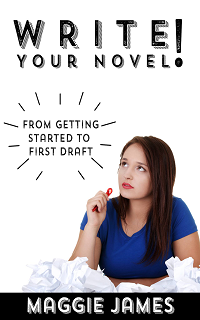 Click the image to buy from Amazon!Most people have been supportive of my career as a novelist. Many incredibly so! One or two, though, haven't. In this post, I'll examine why those around us don't always back us when we make big changes in our lives, and why the right approach to criticism is so important. Not just for authors, but for anyone who's contemplating life-altering goals.
Click the image to buy from Amazon!Most people have been supportive of my career as a novelist. Many incredibly so! One or two, though, haven't. In this post, I'll examine why those around us don't always back us when we make big changes in our lives, and why the right approach to criticism is so important. Not just for authors, but for anyone who's contemplating life-altering goals.
My first book for writers, Write Your Novel! From Getting Started to First Draft, contains a chapter on this subject, aimed at helping writers get their heads in gear. For this post, I'll reproduce part of that chapter here.
Quo te: ‘You must expect great things of yourself before you can do them.’ - Michael Jordan
Here's why your attitude is so important. Without your brain being in alignment with your writing goals, you’ll struggle to succeed. Many people don’t write a novel because their mind-set holds them back. They obey the little voice in their head, the one that whispers, ‘Who do you think you are, wanting to be a novelist? You’ll never manage that.’
How does this happen? Why do people give up on their dreams? Let’s examine some possible reasons.
1. Lack of confidence
 ‘My English teacher at primary school destroyed my confidence,’ Lisa told me. ‘Our homework assignment was to write a page about the Easter holidays. I didn't realise she meant a factual account of what I'd done with my family. Instead, I crafted what I thought was a wonderful story about an Easter bunny that embarks on an egg hunt. My teacher poked fun at me in front of the class and told me it was a poor effort. The humiliation has always stayed with me.’
‘My English teacher at primary school destroyed my confidence,’ Lisa told me. ‘Our homework assignment was to write a page about the Easter holidays. I didn't realise she meant a factual account of what I'd done with my family. Instead, I crafted what I thought was a wonderful story about an Easter bunny that embarks on an egg hunt. My teacher poked fun at me in front of the class and told me it was a poor effort. The humiliation has always stayed with me.’
Ouch! Not hard to understand why Lisa lost confidence in her writing, is it? If this is your issue, do your best to think positively, replacing negative thoughts with healthier ones. Doing so isn't always easy - old habits die hard - but the results are worth the effort. Every time a thought surfaces such as, ‘my writing is hopeless; nobody will want to read this stuff; what's the point in even trying?’ re-frame it straight away. Turn a negative into a positive. Tell yourself: ‘My writing is improving all the time through regular practice. Someone, somewhere, will love my book. I've everything to gain by persevering.’
Get to know yourself. Note down the thoughts you have about your writing, whether they're negative or positive, and consider why the unhelpful ones are surfacing. Then re-frame them in a more effective way, as shown above. A positive attitude paves the way for action, leading to your book getting written. Alter how you think and you'll change at a deep level.
2. Those annoying naysayers
Other people can be brutal. ‘Oh, everyone says they want to write a novel, but it's a pipe dream for most!’ they sneer, thus fuelling your insecurities. Or, ‘writing is OK as a hobby, but you'll never earn an income from it.’
Is there a naysayer in your life? If so, either get them on board or consider how you'll tackle them. The last thing you want is negativity from other people as you write your novel. We novelists excel at beating ourselves up over our efforts - we don't need anyone else to do it for us!
3. Self-appointed experts
‘My sister tells me I'll never make it as a novelist.’ Sadness resonates in Lucy's voice. ‘She says the competition's too difficult and that few people get published these days. In her opinion I need to be more realistic.’
Don't you just love self-appointed experts? Unless Lucy's sister is an author herself or works in publishing, how can she claim such knowledge? Who is she to offer advice to Lucy or to judge her potential success or failure? Her statement fails to account for the meteoric rise of self-publishing, which has shed its former stigma and is now mainstream. Publication has never been easier and it's available to everyone.
Reasons someone in your life might try to sabotage your writing dreams
1. They hold no literary ambitions themselves and so fail to understand others who do. They realise authors exist - someone must write those novels they see on people’s bookshelves - but they don't expect to include such an unusual creature amongst their friends and family.
2. Similar to no 1, but more insidious. Such people are control freaks, believing they know best how you should live your life. Perhaps they belittle your writing dreams. They want to shame you into behaving the way they desire because then everything will fall into place in their cosy little worlds.
3. Like Lucy's sister, they worry you'll face disappointment as a novelist, so they seek to shield you from hurt. They mean well, but such an attitude keeps your horizons narrow. Don’t adopt other people’s limitations as your own.
Dealing with criticism
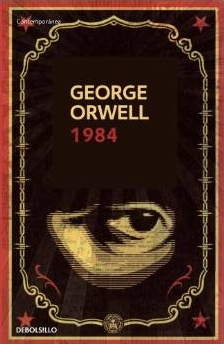 Criticism can be soul destroying, particularly when received as a child. Many people, told when young that their writing wasn't good or that their spelling and punctuation were poor, lost confidence. That's a shame. I doubt anyone, however gifted as a writer, would say their early work shone. It's OK to be bad in the beginning, provided you're willing to learn. Besides, even if you're never a good writer, does that matter? If you yearn to write, then you should. No exceptions, no excuses. You might not publish your novel, but that shouldn't put you off achieving your goal.
Criticism can be soul destroying, particularly when received as a child. Many people, told when young that their writing wasn't good or that their spelling and punctuation were poor, lost confidence. That's a shame. I doubt anyone, however gifted as a writer, would say their early work shone. It's OK to be bad in the beginning, provided you're willing to learn. Besides, even if you're never a good writer, does that matter? If you yearn to write, then you should. No exceptions, no excuses. You might not publish your novel, but that shouldn't put you off achieving your goal.
A thick skin is important. As a writer, you’ll attract plenty of criticism, much of it from people who have never written themselves. The perfect novel doesn't exist. There are umpteen examples of famous novels that have attracted rejection. One of my favourite books is George Orwell's ‘1984’. This dystopian novel is a classic, but many dislike it. Let's take a couple of reviews from Amazon, the first a five-star one, the second a one-star:
5-star review: ‘1984 is an amazingly good read. It's easy to get into and the characters grip you straight away. The language is straightforward and it's a compact story - not a marathon 800-page monster like many modern novels. The dilemma of Winston Smith is so involving that I've found myself re-reading the whole book in one or two sessions (and I know exactly what happens!), because I can't bear to put it down.’
1-star review: ‘Absolutely terrible book that has been hyped up by hipsters. Maybe it was the first to portray a dystopian future but the story could have been far better written. Boring to an extraordinary degree. The characters are rubbish; I feel nothing for them. Winston is a meek cowardly excuse for a human being. The romance is the most unrealistic interaction between two human beings imaginable.’
So who's correct? Both reviewers are! There aren't any rights or wrongs, only readers' perceptions.
Fact: as a published novelist, you’ll face criticism. Not everyone will like your book and some people won’t hesitate in thrusting their opinions down your throat. You have two choices. Either use criticism to improve your work or let it affect you in a negative way, which won’t result in better writing. First, though, learn to distinguish between destructive and constructive criticism.
Destructive: ‘Your book sucks. In fact, it’s the worst I’ve ever read. You’ll never make it as a writer.’
Comments like that are useless and say more about whoever delivers them than they do about your book. There are no pointers as to what to change; moreover, it’s rude. Who needs critics like that?
Constructive: ‘The pace dragged during the middle of your book. At times there was too much description and not enough action or dialogue. I can give specific examples if you’d like.’
Far more helpful! Constructive criticism is intended to show you where and how improvements can be made. In this example, we’re given an idea of what didn’t work for the reader along with an offer of extra feedback. No rudeness, either!
I love this quote from Frank A. Clark:
‘Criticism, like rain, should be gentle enough to nourish a man’s growth without destroying his roots.’
Isn’t that lovely?
(I'll end my excerpt here. The chapter goes on to list actions a budding writer can take to address the issues I've discussed.)
Write Your Novel! From Getting Started to First Draft will be published on July 1, 2015
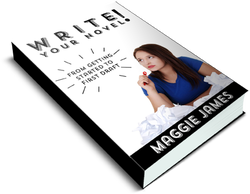 Click the image to buy from Amazon!My book will be published on Wednesday, July 1, 2015, but is available now for pre-order from Amazon. The price will be $0.99/£0.99 for the first week of publication, after which date it will be $2.99/£1.99. Here'sthe link, or click the image on the left.
Click the image to buy from Amazon!My book will be published on Wednesday, July 1, 2015, but is available now for pre-order from Amazon. The price will be $0.99/£0.99 for the first week of publication, after which date it will be $2.99/£1.99. Here'sthe link, or click the image on the left.
Have you always longed to write a novel? In Write Your Novel! From Getting Started to First Draft, I aim to inspire you with the confidence to do just that. With this book, I'll be your cheerleader, your hand-holder. We’ll work on your mind-set, find sources of support, and deal with procrastination issues. I’ll help you carve out the time to write and together we’ll smash through the excuses that are holding you back.
What else? Do you need help in finding ideas? Worried where to start? Unsure whether writing software is right for you? Confused how to plan your novel? No problem! We cover all these issues and more. Every section ends with an action plan so you're raring to go!
I’ve included two chapters on plotting and another with writing advice. That way, once you’ve finished Write Your Novel!, you’ll have an outline in place, one that will inspire you to get going, and you’ll know how to start. My aim is to prepare you to write your novel as soon as you’ve completed the exercises in this book. So if you’ve always yearned to be a novelist but you're unsure how to begin... why not buy Write Your Novel! and get started?Like this post? Please share via the links below:
Why not subscribe to my blog?
 If you've enjoyed this post, how about subscribing to my blog via RSS feed or email? Either click the links in my blog sidebar or sign up via Networked Blogs, also in the sidebar. It'll be great to have you on board!
If you've enjoyed this post, how about subscribing to my blog via RSS feed or email? Either click the links in my blog sidebar or sign up via Networked Blogs, also in the sidebar. It'll be great to have you on board!
Get early bird discounts on my books!
 Want early bird discounts on my future releases, as well as information about special promotions and giveaways? Simply enter your details in the form at the top of the sidebar. I respect your privacy and will never sell your details to any third parties.
Want early bird discounts on my future releases, as well as information about special promotions and giveaways? Simply enter your details in the form at the top of the sidebar. I respect your privacy and will never sell your details to any third parties.
 Click the image to buy from Amazon!Most people have been supportive of my career as a novelist. Many incredibly so! One or two, though, haven't. In this post, I'll examine why those around us don't always back us when we make big changes in our lives, and why the right approach to criticism is so important. Not just for authors, but for anyone who's contemplating life-altering goals.
Click the image to buy from Amazon!Most people have been supportive of my career as a novelist. Many incredibly so! One or two, though, haven't. In this post, I'll examine why those around us don't always back us when we make big changes in our lives, and why the right approach to criticism is so important. Not just for authors, but for anyone who's contemplating life-altering goals.My first book for writers, Write Your Novel! From Getting Started to First Draft, contains a chapter on this subject, aimed at helping writers get their heads in gear. For this post, I'll reproduce part of that chapter here.
Quo te: ‘You must expect great things of yourself before you can do them.’ - Michael Jordan
Here's why your attitude is so important. Without your brain being in alignment with your writing goals, you’ll struggle to succeed. Many people don’t write a novel because their mind-set holds them back. They obey the little voice in their head, the one that whispers, ‘Who do you think you are, wanting to be a novelist? You’ll never manage that.’
How does this happen? Why do people give up on their dreams? Let’s examine some possible reasons.
1. Lack of confidence
 ‘My English teacher at primary school destroyed my confidence,’ Lisa told me. ‘Our homework assignment was to write a page about the Easter holidays. I didn't realise she meant a factual account of what I'd done with my family. Instead, I crafted what I thought was a wonderful story about an Easter bunny that embarks on an egg hunt. My teacher poked fun at me in front of the class and told me it was a poor effort. The humiliation has always stayed with me.’
‘My English teacher at primary school destroyed my confidence,’ Lisa told me. ‘Our homework assignment was to write a page about the Easter holidays. I didn't realise she meant a factual account of what I'd done with my family. Instead, I crafted what I thought was a wonderful story about an Easter bunny that embarks on an egg hunt. My teacher poked fun at me in front of the class and told me it was a poor effort. The humiliation has always stayed with me.’Ouch! Not hard to understand why Lisa lost confidence in her writing, is it? If this is your issue, do your best to think positively, replacing negative thoughts with healthier ones. Doing so isn't always easy - old habits die hard - but the results are worth the effort. Every time a thought surfaces such as, ‘my writing is hopeless; nobody will want to read this stuff; what's the point in even trying?’ re-frame it straight away. Turn a negative into a positive. Tell yourself: ‘My writing is improving all the time through regular practice. Someone, somewhere, will love my book. I've everything to gain by persevering.’
Get to know yourself. Note down the thoughts you have about your writing, whether they're negative or positive, and consider why the unhelpful ones are surfacing. Then re-frame them in a more effective way, as shown above. A positive attitude paves the way for action, leading to your book getting written. Alter how you think and you'll change at a deep level.
2. Those annoying naysayers
Other people can be brutal. ‘Oh, everyone says they want to write a novel, but it's a pipe dream for most!’ they sneer, thus fuelling your insecurities. Or, ‘writing is OK as a hobby, but you'll never earn an income from it.’
Is there a naysayer in your life? If so, either get them on board or consider how you'll tackle them. The last thing you want is negativity from other people as you write your novel. We novelists excel at beating ourselves up over our efforts - we don't need anyone else to do it for us!
3. Self-appointed experts
‘My sister tells me I'll never make it as a novelist.’ Sadness resonates in Lucy's voice. ‘She says the competition's too difficult and that few people get published these days. In her opinion I need to be more realistic.’
Don't you just love self-appointed experts? Unless Lucy's sister is an author herself or works in publishing, how can she claim such knowledge? Who is she to offer advice to Lucy or to judge her potential success or failure? Her statement fails to account for the meteoric rise of self-publishing, which has shed its former stigma and is now mainstream. Publication has never been easier and it's available to everyone.
Reasons someone in your life might try to sabotage your writing dreams
1. They hold no literary ambitions themselves and so fail to understand others who do. They realise authors exist - someone must write those novels they see on people’s bookshelves - but they don't expect to include such an unusual creature amongst their friends and family.
2. Similar to no 1, but more insidious. Such people are control freaks, believing they know best how you should live your life. Perhaps they belittle your writing dreams. They want to shame you into behaving the way they desire because then everything will fall into place in their cosy little worlds.
3. Like Lucy's sister, they worry you'll face disappointment as a novelist, so they seek to shield you from hurt. They mean well, but such an attitude keeps your horizons narrow. Don’t adopt other people’s limitations as your own.
Dealing with criticism
 Criticism can be soul destroying, particularly when received as a child. Many people, told when young that their writing wasn't good or that their spelling and punctuation were poor, lost confidence. That's a shame. I doubt anyone, however gifted as a writer, would say their early work shone. It's OK to be bad in the beginning, provided you're willing to learn. Besides, even if you're never a good writer, does that matter? If you yearn to write, then you should. No exceptions, no excuses. You might not publish your novel, but that shouldn't put you off achieving your goal.
Criticism can be soul destroying, particularly when received as a child. Many people, told when young that their writing wasn't good or that their spelling and punctuation were poor, lost confidence. That's a shame. I doubt anyone, however gifted as a writer, would say their early work shone. It's OK to be bad in the beginning, provided you're willing to learn. Besides, even if you're never a good writer, does that matter? If you yearn to write, then you should. No exceptions, no excuses. You might not publish your novel, but that shouldn't put you off achieving your goal.A thick skin is important. As a writer, you’ll attract plenty of criticism, much of it from people who have never written themselves. The perfect novel doesn't exist. There are umpteen examples of famous novels that have attracted rejection. One of my favourite books is George Orwell's ‘1984’. This dystopian novel is a classic, but many dislike it. Let's take a couple of reviews from Amazon, the first a five-star one, the second a one-star:
5-star review: ‘1984 is an amazingly good read. It's easy to get into and the characters grip you straight away. The language is straightforward and it's a compact story - not a marathon 800-page monster like many modern novels. The dilemma of Winston Smith is so involving that I've found myself re-reading the whole book in one or two sessions (and I know exactly what happens!), because I can't bear to put it down.’
1-star review: ‘Absolutely terrible book that has been hyped up by hipsters. Maybe it was the first to portray a dystopian future but the story could have been far better written. Boring to an extraordinary degree. The characters are rubbish; I feel nothing for them. Winston is a meek cowardly excuse for a human being. The romance is the most unrealistic interaction between two human beings imaginable.’
So who's correct? Both reviewers are! There aren't any rights or wrongs, only readers' perceptions.
Fact: as a published novelist, you’ll face criticism. Not everyone will like your book and some people won’t hesitate in thrusting their opinions down your throat. You have two choices. Either use criticism to improve your work or let it affect you in a negative way, which won’t result in better writing. First, though, learn to distinguish between destructive and constructive criticism.
Destructive: ‘Your book sucks. In fact, it’s the worst I’ve ever read. You’ll never make it as a writer.’
Comments like that are useless and say more about whoever delivers them than they do about your book. There are no pointers as to what to change; moreover, it’s rude. Who needs critics like that?
Constructive: ‘The pace dragged during the middle of your book. At times there was too much description and not enough action or dialogue. I can give specific examples if you’d like.’
Far more helpful! Constructive criticism is intended to show you where and how improvements can be made. In this example, we’re given an idea of what didn’t work for the reader along with an offer of extra feedback. No rudeness, either!
I love this quote from Frank A. Clark:
‘Criticism, like rain, should be gentle enough to nourish a man’s growth without destroying his roots.’
Isn’t that lovely?
(I'll end my excerpt here. The chapter goes on to list actions a budding writer can take to address the issues I've discussed.)
Write Your Novel! From Getting Started to First Draft will be published on July 1, 2015
 Click the image to buy from Amazon!My book will be published on Wednesday, July 1, 2015, but is available now for pre-order from Amazon. The price will be $0.99/£0.99 for the first week of publication, after which date it will be $2.99/£1.99. Here'sthe link, or click the image on the left.
Click the image to buy from Amazon!My book will be published on Wednesday, July 1, 2015, but is available now for pre-order from Amazon. The price will be $0.99/£0.99 for the first week of publication, after which date it will be $2.99/£1.99. Here'sthe link, or click the image on the left.Have you always longed to write a novel? In Write Your Novel! From Getting Started to First Draft, I aim to inspire you with the confidence to do just that. With this book, I'll be your cheerleader, your hand-holder. We’ll work on your mind-set, find sources of support, and deal with procrastination issues. I’ll help you carve out the time to write and together we’ll smash through the excuses that are holding you back.
What else? Do you need help in finding ideas? Worried where to start? Unsure whether writing software is right for you? Confused how to plan your novel? No problem! We cover all these issues and more. Every section ends with an action plan so you're raring to go!
I’ve included two chapters on plotting and another with writing advice. That way, once you’ve finished Write Your Novel!, you’ll have an outline in place, one that will inspire you to get going, and you’ll know how to start. My aim is to prepare you to write your novel as soon as you’ve completed the exercises in this book. So if you’ve always yearned to be a novelist but you're unsure how to begin... why not buy Write Your Novel! and get started?Like this post? Please share via the links below:
Why not subscribe to my blog?
 If you've enjoyed this post, how about subscribing to my blog via RSS feed or email? Either click the links in my blog sidebar or sign up via Networked Blogs, also in the sidebar. It'll be great to have you on board!
If you've enjoyed this post, how about subscribing to my blog via RSS feed or email? Either click the links in my blog sidebar or sign up via Networked Blogs, also in the sidebar. It'll be great to have you on board!Get early bird discounts on my books!
 Want early bird discounts on my future releases, as well as information about special promotions and giveaways? Simply enter your details in the form at the top of the sidebar. I respect your privacy and will never sell your details to any third parties.
Want early bird discounts on my future releases, as well as information about special promotions and giveaways? Simply enter your details in the form at the top of the sidebar. I respect your privacy and will never sell your details to any third parties.
Published on June 24, 2015 07:45
June 18, 2015
Want to write a novel? Why you should do it
By Maggie James
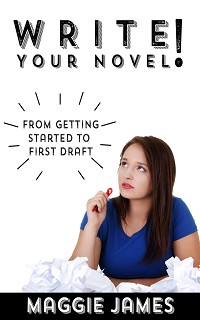 I'm proud to announce that my latest book, 'Write Your Novel! From Getting Started to First Draft' will be published on Wednesday, July 1. It is available for pre-order at the introductory price of $0.99/£0.99 for the first week of publication. Here's the link.
I'm proud to announce that my latest book, 'Write Your Novel! From Getting Started to First Draft' will be published on Wednesday, July 1. It is available for pre-order at the introductory price of $0.99/£0.99 for the first week of publication. Here's the link.
It's my aim to help as many people become novelists as I can, if that's their dream. In this post, I'll explain why I've written this book and why anyone who wants to write a novel should do so. Here's why. Once people know I'm a novelist, the conversation often goes like this:
Other person: What do you do for a living?
Me: I'm a novelist.
OP: Oh, I've always wanted to write a novel.
Me: Great! Have you made a start?
OP: It's impossible. I lack the time/I'm not sure how to begin/I'll do it when the kids leave home...
It's understandable why so few people write books. Most of us lead busy lives, and it’s easy to push novel-writing onto a back burner. Furthermore, we fear failure. When your novel exists in your head, it's the best one ever written. Start it, and you risk the realisation you're no good. Or you don't enjoy writing. Or you're terrified about what people will say/how they'll judge your book. You can't fail if you don't try, right?
Actions speak louder than words
By itself, it's not enough to want to write a novel. Somewhere along the line you need to put pen to paper or fingers to keyboard. And that's where many people flounder. For them, writing a novel is too daunting a task. And I understand that. For decades, I procrastinated. Oh, it wasn't that I didn't possess a strong desire to write - I did. Ever since childhood, I dreamed of being a novelist, of holding my first book in my hands.
But I did nothing about it. In my twenties, I told myself I lacked sufficient life experience. Hogwash. Many a successful novelist has started young. Later I didn't even make excuses anymore. Being a novelist was still my dream, yet I remained an accountant. The enormity of the task weighed on me, however. How could I tackle 100,000 words? I had no idea where to start.
So I understand how daunting the prospect of writing a novel can be. Now, with several books under my belt, I smile at my former hesitation. It's my goal that one day you’ll smile at yours.What about you?
 So you possess a strong desire to write a novel. Or maybe you're just curious. Perhaps you've often wondered whether a book lurks inside you and you'd love to find out. But a thousand other priorities are also clamouring for your attention. Why should you set aside some of your precious time to write a novel?
So you possess a strong desire to write a novel. Or maybe you're just curious. Perhaps you've often wondered whether a book lurks inside you and you'd love to find out. But a thousand other priorities are also clamouring for your attention. Why should you set aside some of your precious time to write a novel?
Here’s why. It's a cliché, but life's too short to ignore your dreams. You’ll kiss goodbye to one of them if you don’t write your book. In addition, you’ll never find out what could have been. Your first novel might have reached the best-seller lists. Or at least earned you a side income. Touched someone deeply in ways you could never anticipate. Or changed you on a level you can’t imagine.
So what's your choice? Ten, twenty, thirty years from now, will you reflect on the novels you’ve completed and smile? Or will you regret the words you didn’t write?
To paraphrase the eminent Dr Wayne Dyer: ‘Don’t die with your novel still inside you.’What have you written so far?
What writing have you done in the past? Of what length? Don’t overlook diaries, journals, blogs, work documents – they all count. Short stories? Fan fiction? A dissertation? Training manual? Even if what you’ve written has been non-fiction, it’s all good practice.
How do you feel about completing at least 80,000 words? (A novel is any fictional work greater than that length.) Are you daunted or enthused? Don't worry - there's no right or wrong answer. You may never have attempted a creative word in your life, but still possess a burning desire to produce a novel. Or perhaps you've written plenty of shorter material, but aren't sure whether you can go the distance that a novel requires. No problem. Only two things matter. One is the urge to write a novel. The second is committing to seeing it through. You must decide you'll write your book no matter what happens, and that you won’t stop until you finish.
Let's be clear. When you write a novel, you embark on a marathon, not a sprint. You must commit to the process for the long term. Ninety to a hundred thousand words won't happen overnight and you'll need to write when you're tired, when the words aren't flowing, when you're wondering why you ever started.Reasons not to write a novel
Don't do it for the money. Novel writing has the potential to make you rich, sure, but you can't count on that. It might not make you famous, either, although the possibility exists. Write because you're driven to do so, because the itch won't go away. Do it irrespective of whether you intend to seek publication. Some people never publish their novels - they write for their own satisfaction, or for their families, or as a catharsis for their issues.
What about you?
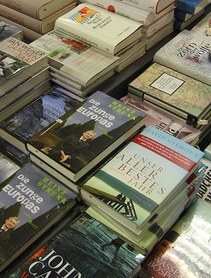 Have you always longed to write a novel? In 'Write Your Novel! From Getting Started to First Draft' I aim to inspire you with the confidence to do just that. With this book, I'll be your cheerleader, your hand-holder. We’ll work on your mind-set, find sources of support, and deal with procrastination issues. I’ll help you carve out the time to write and together we’ll smash through the excuses that are holding you back.
Have you always longed to write a novel? In 'Write Your Novel! From Getting Started to First Draft' I aim to inspire you with the confidence to do just that. With this book, I'll be your cheerleader, your hand-holder. We’ll work on your mind-set, find sources of support, and deal with procrastination issues. I’ll help you carve out the time to write and together we’ll smash through the excuses that are holding you back.
Do you need help in finding ideas? Worried where to start? Unsure whether writing software is right for you? Confused how to plan your novel? No problem! We cover all these issues and more. Every section ends with an action plan so you're raring to go!
I’ve included two chapters on plotting and another with writing advice. That way, once you’ve finished 'Write Your Novel!', you’ll have an outline in place, one that will inspire you to get going, and you’ll know how to start. My aim is to prepare you to write your novel as soon as you’ve completed the exercises in the book.
'Write Your Novel!' is for you if you've always wanted to write a novel but:
Haven't a clue where to start
Lack the confidence
Are unsure whether writing a novel is for you
Have written nothing or shorter fiction to date
Lack the knowledge how to plot a novel
You might be:
Unsure where you'll find the time
Undecided what kind of novel to write
Worried about what people will say
Concerned your grasp of English isn’t up to par
So if you’ve always yearned to be a novelist but you're unsure how to begin... why not buy 'Write Your Novel!' and get started? Here's the pre-order link. Get it whilst the price is only $0.99/£0.99!
Enjoyed this post? Please share via the links below:
Why not subscribe to my blog?
 If you've enjoyed this post, how about subscribing to my blog via RSS feed or email? Either click the links in my blog sidebar or sign up via Networked Blogs, also in the sidebar. It'll be great to have you on board!
If you've enjoyed this post, how about subscribing to my blog via RSS feed or email? Either click the links in my blog sidebar or sign up via Networked Blogs, also in the sidebar. It'll be great to have you on board!
Get early bird discounts on my books!
 Want early bird discounts on my future releases, as well as information about special promotions and giveaways? Simply enter your details in the form at the top of the sidebar. I respect your privacy and will never sell your details to any third parties.
Want early bird discounts on my future releases, as well as information about special promotions and giveaways? Simply enter your details in the form at the top of the sidebar. I respect your privacy and will never sell your details to any third parties.
 I'm proud to announce that my latest book, 'Write Your Novel! From Getting Started to First Draft' will be published on Wednesday, July 1. It is available for pre-order at the introductory price of $0.99/£0.99 for the first week of publication. Here's the link.
I'm proud to announce that my latest book, 'Write Your Novel! From Getting Started to First Draft' will be published on Wednesday, July 1. It is available for pre-order at the introductory price of $0.99/£0.99 for the first week of publication. Here's the link.It's my aim to help as many people become novelists as I can, if that's their dream. In this post, I'll explain why I've written this book and why anyone who wants to write a novel should do so. Here's why. Once people know I'm a novelist, the conversation often goes like this:
Other person: What do you do for a living?
Me: I'm a novelist.
OP: Oh, I've always wanted to write a novel.
Me: Great! Have you made a start?
OP: It's impossible. I lack the time/I'm not sure how to begin/I'll do it when the kids leave home...
It's understandable why so few people write books. Most of us lead busy lives, and it’s easy to push novel-writing onto a back burner. Furthermore, we fear failure. When your novel exists in your head, it's the best one ever written. Start it, and you risk the realisation you're no good. Or you don't enjoy writing. Or you're terrified about what people will say/how they'll judge your book. You can't fail if you don't try, right?
Actions speak louder than words
By itself, it's not enough to want to write a novel. Somewhere along the line you need to put pen to paper or fingers to keyboard. And that's where many people flounder. For them, writing a novel is too daunting a task. And I understand that. For decades, I procrastinated. Oh, it wasn't that I didn't possess a strong desire to write - I did. Ever since childhood, I dreamed of being a novelist, of holding my first book in my hands.
But I did nothing about it. In my twenties, I told myself I lacked sufficient life experience. Hogwash. Many a successful novelist has started young. Later I didn't even make excuses anymore. Being a novelist was still my dream, yet I remained an accountant. The enormity of the task weighed on me, however. How could I tackle 100,000 words? I had no idea where to start.
So I understand how daunting the prospect of writing a novel can be. Now, with several books under my belt, I smile at my former hesitation. It's my goal that one day you’ll smile at yours.What about you?
 So you possess a strong desire to write a novel. Or maybe you're just curious. Perhaps you've often wondered whether a book lurks inside you and you'd love to find out. But a thousand other priorities are also clamouring for your attention. Why should you set aside some of your precious time to write a novel?
So you possess a strong desire to write a novel. Or maybe you're just curious. Perhaps you've often wondered whether a book lurks inside you and you'd love to find out. But a thousand other priorities are also clamouring for your attention. Why should you set aside some of your precious time to write a novel?Here’s why. It's a cliché, but life's too short to ignore your dreams. You’ll kiss goodbye to one of them if you don’t write your book. In addition, you’ll never find out what could have been. Your first novel might have reached the best-seller lists. Or at least earned you a side income. Touched someone deeply in ways you could never anticipate. Or changed you on a level you can’t imagine.
So what's your choice? Ten, twenty, thirty years from now, will you reflect on the novels you’ve completed and smile? Or will you regret the words you didn’t write?
To paraphrase the eminent Dr Wayne Dyer: ‘Don’t die with your novel still inside you.’What have you written so far?
What writing have you done in the past? Of what length? Don’t overlook diaries, journals, blogs, work documents – they all count. Short stories? Fan fiction? A dissertation? Training manual? Even if what you’ve written has been non-fiction, it’s all good practice.
How do you feel about completing at least 80,000 words? (A novel is any fictional work greater than that length.) Are you daunted or enthused? Don't worry - there's no right or wrong answer. You may never have attempted a creative word in your life, but still possess a burning desire to produce a novel. Or perhaps you've written plenty of shorter material, but aren't sure whether you can go the distance that a novel requires. No problem. Only two things matter. One is the urge to write a novel. The second is committing to seeing it through. You must decide you'll write your book no matter what happens, and that you won’t stop until you finish.
Let's be clear. When you write a novel, you embark on a marathon, not a sprint. You must commit to the process for the long term. Ninety to a hundred thousand words won't happen overnight and you'll need to write when you're tired, when the words aren't flowing, when you're wondering why you ever started.Reasons not to write a novel
Don't do it for the money. Novel writing has the potential to make you rich, sure, but you can't count on that. It might not make you famous, either, although the possibility exists. Write because you're driven to do so, because the itch won't go away. Do it irrespective of whether you intend to seek publication. Some people never publish their novels - they write for their own satisfaction, or for their families, or as a catharsis for their issues.
What about you?
 Have you always longed to write a novel? In 'Write Your Novel! From Getting Started to First Draft' I aim to inspire you with the confidence to do just that. With this book, I'll be your cheerleader, your hand-holder. We’ll work on your mind-set, find sources of support, and deal with procrastination issues. I’ll help you carve out the time to write and together we’ll smash through the excuses that are holding you back.
Have you always longed to write a novel? In 'Write Your Novel! From Getting Started to First Draft' I aim to inspire you with the confidence to do just that. With this book, I'll be your cheerleader, your hand-holder. We’ll work on your mind-set, find sources of support, and deal with procrastination issues. I’ll help you carve out the time to write and together we’ll smash through the excuses that are holding you back.Do you need help in finding ideas? Worried where to start? Unsure whether writing software is right for you? Confused how to plan your novel? No problem! We cover all these issues and more. Every section ends with an action plan so you're raring to go!
I’ve included two chapters on plotting and another with writing advice. That way, once you’ve finished 'Write Your Novel!', you’ll have an outline in place, one that will inspire you to get going, and you’ll know how to start. My aim is to prepare you to write your novel as soon as you’ve completed the exercises in the book.
'Write Your Novel!' is for you if you've always wanted to write a novel but:
Haven't a clue where to start
Lack the confidence
Are unsure whether writing a novel is for you
Have written nothing or shorter fiction to date
Lack the knowledge how to plot a novel
You might be:
Unsure where you'll find the time
Undecided what kind of novel to write
Worried about what people will say
Concerned your grasp of English isn’t up to par
So if you’ve always yearned to be a novelist but you're unsure how to begin... why not buy 'Write Your Novel!' and get started? Here's the pre-order link. Get it whilst the price is only $0.99/£0.99!
Enjoyed this post? Please share via the links below:
Why not subscribe to my blog?
 If you've enjoyed this post, how about subscribing to my blog via RSS feed or email? Either click the links in my blog sidebar or sign up via Networked Blogs, also in the sidebar. It'll be great to have you on board!
If you've enjoyed this post, how about subscribing to my blog via RSS feed or email? Either click the links in my blog sidebar or sign up via Networked Blogs, also in the sidebar. It'll be great to have you on board!Get early bird discounts on my books!
 Want early bird discounts on my future releases, as well as information about special promotions and giveaways? Simply enter your details in the form at the top of the sidebar. I respect your privacy and will never sell your details to any third parties.
Want early bird discounts on my future releases, as well as information about special promotions and giveaways? Simply enter your details in the form at the top of the sidebar. I respect your privacy and will never sell your details to any third parties.
Published on June 18, 2015 06:26
May 27, 2015
Competition - who's your favourite fictional psychopath?
By Maggie James
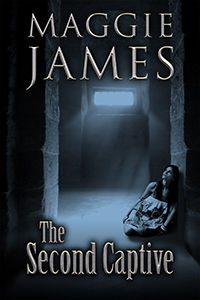 Help, please! As readers of my novels will know, I have a penchant for creating dark characters. Aren't sociopaths compelling? (At a safe distance, and in fictional form, of course!)
Help, please! As readers of my novels will know, I have a penchant for creating dark characters. Aren't sociopaths compelling? (At a safe distance, and in fictional form, of course!)
I'd love your input for when I create more of these bad guys and girls. Fictional psychopaths came in all varieties, from axe-wielding Annie Wilkes to suave Tom Ripley. My question centres on which ones are most popular with readers. Do you prefer your maniacs bloodthirsty and scary, or are manipulative charmers more your taste? Perhaps a combination of the two, such as Hannibal Lecter?
So I've created a competition. As a prize, I'm offering a copy of my latest novel, The Second Captive, featuring the dark and disturbed Dominic Perdue. A man whose past blinkers him to the suffering he inflicts on his captive, the naive and vulnerable Beth Sutton. A study of emotional dependency, The Second Captive explores Stockholm syndrome, a psychological condition in which an abused individual develops feelings for his/her captor. I blogged about it in a previous post.
Read more about The Second Captive here.
How to enter:
1. Leave a comment, telling me who your favourite fictional psychopath is, and why. What makes him/her so fascinating?
2. Tell me which ebook format you'd prefer - kindle, epub or PDF.
The closing date is June 30, 2015. On 1 July, I'll pick a winner, and email him/her a copy of The Second Captive.
Would anyone you know enjoy The Second Captive? Then please share this post via the links below:
Why not subscribe to my blog?
 If you've enjoyed this post, how about subscribing to my blog via RSS feed or email? Either click the links in my blog sidebar or sign up via Networked Blogs, also in the sidebar. It'll be great to have you on board!
If you've enjoyed this post, how about subscribing to my blog via RSS feed or email? Either click the links in my blog sidebar or sign up via Networked Blogs, also in the sidebar. It'll be great to have you on board!
Get early bird discounts on my books!
 Want early bird discounts on my future releases, as well as information about special promotions and giveaways? Simply enter your details in the form at the top of the sidebar. I respect your privacy and will never sell your details to any third parties.
Want early bird discounts on my future releases, as well as information about special promotions and giveaways? Simply enter your details in the form at the top of the sidebar. I respect your privacy and will never sell your details to any third parties.
 Help, please! As readers of my novels will know, I have a penchant for creating dark characters. Aren't sociopaths compelling? (At a safe distance, and in fictional form, of course!)
Help, please! As readers of my novels will know, I have a penchant for creating dark characters. Aren't sociopaths compelling? (At a safe distance, and in fictional form, of course!)I'd love your input for when I create more of these bad guys and girls. Fictional psychopaths came in all varieties, from axe-wielding Annie Wilkes to suave Tom Ripley. My question centres on which ones are most popular with readers. Do you prefer your maniacs bloodthirsty and scary, or are manipulative charmers more your taste? Perhaps a combination of the two, such as Hannibal Lecter?
So I've created a competition. As a prize, I'm offering a copy of my latest novel, The Second Captive, featuring the dark and disturbed Dominic Perdue. A man whose past blinkers him to the suffering he inflicts on his captive, the naive and vulnerable Beth Sutton. A study of emotional dependency, The Second Captive explores Stockholm syndrome, a psychological condition in which an abused individual develops feelings for his/her captor. I blogged about it in a previous post.
Read more about The Second Captive here.
How to enter:
1. Leave a comment, telling me who your favourite fictional psychopath is, and why. What makes him/her so fascinating?
2. Tell me which ebook format you'd prefer - kindle, epub or PDF.
The closing date is June 30, 2015. On 1 July, I'll pick a winner, and email him/her a copy of The Second Captive.
Would anyone you know enjoy The Second Captive? Then please share this post via the links below:
Why not subscribe to my blog?
 If you've enjoyed this post, how about subscribing to my blog via RSS feed or email? Either click the links in my blog sidebar or sign up via Networked Blogs, also in the sidebar. It'll be great to have you on board!
If you've enjoyed this post, how about subscribing to my blog via RSS feed or email? Either click the links in my blog sidebar or sign up via Networked Blogs, also in the sidebar. It'll be great to have you on board!Get early bird discounts on my books!
 Want early bird discounts on my future releases, as well as information about special promotions and giveaways? Simply enter your details in the form at the top of the sidebar. I respect your privacy and will never sell your details to any third parties.
Want early bird discounts on my future releases, as well as information about special promotions and giveaways? Simply enter your details in the form at the top of the sidebar. I respect your privacy and will never sell your details to any third parties.
Published on May 27, 2015 03:45
May 21, 2015
'Write Your Novel!' will soon be published
By Maggie James
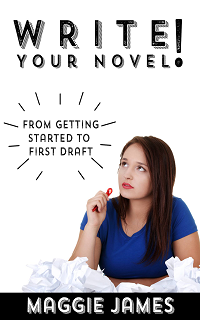 Have you always longed to write a novel? Does a part of you yearn to discover whether you could? You're not alone. Many people have confided in me about their literary ambitions as well as what's blocking them. For some, it's the time factor. For others, lack of confidence holds them back. Whatever the reason, they're not fulfilling a cherished dream, and that's a shame.
Have you always longed to write a novel? Does a part of you yearn to discover whether you could? You're not alone. Many people have confided in me about their literary ambitions as well as what's blocking them. For some, it's the time factor. For others, lack of confidence holds them back. Whatever the reason, they're not fulfilling a cherished dream, and that's a shame.
I wrote my book to help these would-be novelists. My aim is to infuse them with the certainty they can complete 100,000 words. In the book, I examine the most common excuses for not writing, the equipment you'll need and how to improve your mind-set. I'll define the difference between a planner and a pantser, explain how to get support as you write, and where to find the time. I cover specialist software and what to do if you're not tech-savvy. How to beat procrastination. Finding ideas and inspiration. Plus the meaty stuff - plotting a novel, completing your first draft, and tips for better writing. Once you've worked through the action plan at the end of each chapter, you'll be in a position to write your novel.
I don't cover editing, marketing or publication. Each of those topics warrants a book in itself! I do, however, provide resources and suggestions for further reading. Besides, 'Write Your Novel!' doesn't purport to be a treatise on every aspect of novel-writing. The strapline is 'From Getting Started to First Draft'. That's enough for newbie novelists to cope with, I suspect.
Do you know anyone who wants to write their first novel?
 I've sent my beta readers their copies of 'Write Your Novel!' Whilst they're compiling their feedback, I'll catch up with my to-do list and enjoy the May Bank Holiday here in the UK. Once I receive the responses, I'll incorporate their suggestions, and then publish the book. The estimated release date will be early in June 2015.
I've sent my beta readers their copies of 'Write Your Novel!' Whilst they're compiling their feedback, I'll catch up with my to-do list and enjoy the May Bank Holiday here in the UK. Once I receive the responses, I'll incorporate their suggestions, and then publish the book. The estimated release date will be early in June 2015.
If you know anyone whose ambition is to write a novel, but hasn't yet done so, please would you forward this blog post to them? I'd love to help others achieve what was, for me, an unfulfilled dream for so many years. From time to time, I've considering utilising my life coaching qualification and providing a mentoring service for writers. A friend was kind enough to tell me he thought I'd be good at it, and what a satisfying sideline to novel-writing it would be!
If you'd like to be notified when 'Write Your Novel!' is available for purchase, sign up for my newsletter in the top right-hand corner. Thank you!
Any suggestions about 'Write Your Novel!'?
If you have any suggestions as to what you'd like to find in 'Write Your Novel!', leave me a comment. The chances are I've already included it, but all ideas are welcome!
Enjoyed this post? Please click the links below to share
Why not subscribe to my blog?
 If you've enjoyed this post, how about subscribing to my blog via RSS feed or email? Either click the links in my blog sidebar or sign up via Networked Blogs, also in the sidebar.
If you've enjoyed this post, how about subscribing to my blog via RSS feed or email? Either click the links in my blog sidebar or sign up via Networked Blogs, also in the sidebar.
It'll be great to have you on board!
Get early bird discounts on my books!
 Want early bird discounts on my future releases, as well as information about special promotions and giveaways? Simply enter your details in the form at the top of the sidebar.
Want early bird discounts on my future releases, as well as information about special promotions and giveaways? Simply enter your details in the form at the top of the sidebar.
I respect your privacy and will never sell your details to any third parties.
 Have you always longed to write a novel? Does a part of you yearn to discover whether you could? You're not alone. Many people have confided in me about their literary ambitions as well as what's blocking them. For some, it's the time factor. For others, lack of confidence holds them back. Whatever the reason, they're not fulfilling a cherished dream, and that's a shame.
Have you always longed to write a novel? Does a part of you yearn to discover whether you could? You're not alone. Many people have confided in me about their literary ambitions as well as what's blocking them. For some, it's the time factor. For others, lack of confidence holds them back. Whatever the reason, they're not fulfilling a cherished dream, and that's a shame. I wrote my book to help these would-be novelists. My aim is to infuse them with the certainty they can complete 100,000 words. In the book, I examine the most common excuses for not writing, the equipment you'll need and how to improve your mind-set. I'll define the difference between a planner and a pantser, explain how to get support as you write, and where to find the time. I cover specialist software and what to do if you're not tech-savvy. How to beat procrastination. Finding ideas and inspiration. Plus the meaty stuff - plotting a novel, completing your first draft, and tips for better writing. Once you've worked through the action plan at the end of each chapter, you'll be in a position to write your novel.
I don't cover editing, marketing or publication. Each of those topics warrants a book in itself! I do, however, provide resources and suggestions for further reading. Besides, 'Write Your Novel!' doesn't purport to be a treatise on every aspect of novel-writing. The strapline is 'From Getting Started to First Draft'. That's enough for newbie novelists to cope with, I suspect.
Do you know anyone who wants to write their first novel?
 I've sent my beta readers their copies of 'Write Your Novel!' Whilst they're compiling their feedback, I'll catch up with my to-do list and enjoy the May Bank Holiday here in the UK. Once I receive the responses, I'll incorporate their suggestions, and then publish the book. The estimated release date will be early in June 2015.
I've sent my beta readers their copies of 'Write Your Novel!' Whilst they're compiling their feedback, I'll catch up with my to-do list and enjoy the May Bank Holiday here in the UK. Once I receive the responses, I'll incorporate their suggestions, and then publish the book. The estimated release date will be early in June 2015.If you know anyone whose ambition is to write a novel, but hasn't yet done so, please would you forward this blog post to them? I'd love to help others achieve what was, for me, an unfulfilled dream for so many years. From time to time, I've considering utilising my life coaching qualification and providing a mentoring service for writers. A friend was kind enough to tell me he thought I'd be good at it, and what a satisfying sideline to novel-writing it would be!
If you'd like to be notified when 'Write Your Novel!' is available for purchase, sign up for my newsletter in the top right-hand corner. Thank you!
Any suggestions about 'Write Your Novel!'?
If you have any suggestions as to what you'd like to find in 'Write Your Novel!', leave me a comment. The chances are I've already included it, but all ideas are welcome!
Enjoyed this post? Please click the links below to share
Why not subscribe to my blog?
 If you've enjoyed this post, how about subscribing to my blog via RSS feed or email? Either click the links in my blog sidebar or sign up via Networked Blogs, also in the sidebar.
If you've enjoyed this post, how about subscribing to my blog via RSS feed or email? Either click the links in my blog sidebar or sign up via Networked Blogs, also in the sidebar.It'll be great to have you on board!
Get early bird discounts on my books!
 Want early bird discounts on my future releases, as well as information about special promotions and giveaways? Simply enter your details in the form at the top of the sidebar.
Want early bird discounts on my future releases, as well as information about special promotions and giveaways? Simply enter your details in the form at the top of the sidebar.I respect your privacy and will never sell your details to any third parties.
Published on May 21, 2015 07:04
May 14, 2015
My first radio interview
By Maggie James
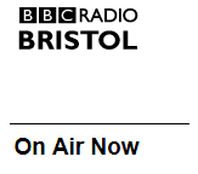 On Tuesday of this week, I did my first radio interview. A fascinating experience, and a very positive one! Boy, was I nervous! If anyone had asked me beforehand whether I'd be apprehensive, I'd have replied, 'No - bring it on!' Turns out I was wrong...
On Tuesday of this week, I did my first radio interview. A fascinating experience, and a very positive one! Boy, was I nervous! If anyone had asked me beforehand whether I'd be apprehensive, I'd have replied, 'No - bring it on!' Turns out I was wrong...
My interview was to take place at 12.30pm on Tuesday May 12 with Steve Yabsley from BBC Radio Bristol. After I arranged the date, I put it out of my mind. As it grew nearer, though, worry edged into my thinking. What have I done? How will it go? Eek!
On the day itself, my nerves didn't abate. Paranoia about car failure or other calamities ensured I arrived at the BBC studios way too early. As I listened to the show go out on air, Steve mentioned me, telling his audience he'd be interviewing a local novelist about her 'scary books' later. I couldn't help but smile; he sounded so pleasant, so natural, and my nervousness abated a little. One thing was for sure; this was happening, and soon! Yikes!
At 12.20pm, Steve's assistant, Simon, came to fetch me from the waiting area. At 12.30, whilst the traffic report went out on air, Steve emerged from the studio, smiling a warm welcome and showing me inside. My nerves melted away. I was ready.
Inspiration, my time in Bolivia, and why I write dark fiction
 My interviewer, Steve YabsleyOnce inside, my gremlins didn't get a chance to return. Steve showed me to my seat and within seconds we were under way. He'd already requested a paperback copy of my latest book, The Second Captive, for us to discuss. The interview covered much more, though. We talked about my former careers as an accountant and nutritional therapist, what books I read as a child, and my extended trip to South America. We discussed the inspiration for my novels, the reason I write dark fiction, and why I base my books in Bristol.
My interviewer, Steve YabsleyOnce inside, my gremlins didn't get a chance to return. Steve showed me to my seat and within seconds we were under way. He'd already requested a paperback copy of my latest book, The Second Captive, for us to discuss. The interview covered much more, though. We talked about my former careers as an accountant and nutritional therapist, what books I read as a child, and my extended trip to South America. We discussed the inspiration for my novels, the reason I write dark fiction, and why I base my books in Bristol.
Before I knew it, we were done. I don't remember much about the interview; my concentration was so focused on my role in the 'hot seat' that the details are a blur. I've not listened to the playback, but I've been told everything went fine and that I sounded good.
Afterwards, Steve was very helpful, advising me I should approach producers about getting my books adapted for television. What a great idea! It's worth a shot - and I'd love to see 'The Second Captive', or any of my novels, on the small screen.
Why did I get so nervous? I'm not sure. Who doesn't like talking about themselves to a captive audience? One thing's certain- I'm delighted I seized this opportunity. I worked through my fear and next time I'll be fine. Bring it on!
If you'd like to listen to the interview, it's available via this link. I'm on after approximately thirty minutes.
Enjoyed this post? Please share via the links below:
Why not subscribe to my blog?
 If you've enjoyed this post, how about subscribing to my blog via RSS feed or email?
If you've enjoyed this post, how about subscribing to my blog via RSS feed or email?
Either click the links in my blog sidebar or sign up via Networked Blogs, also in the sidebar. It'll be great to have you on board!
Get early bird discounts on my books!
 Want early bird discounts on my future releases, as well as information about special promotions and giveaways? Simply enter your details in the form at the top of the sidebar. I respect your privacy and will never sell your details to any third parties.
Want early bird discounts on my future releases, as well as information about special promotions and giveaways? Simply enter your details in the form at the top of the sidebar. I respect your privacy and will never sell your details to any third parties.
 On Tuesday of this week, I did my first radio interview. A fascinating experience, and a very positive one! Boy, was I nervous! If anyone had asked me beforehand whether I'd be apprehensive, I'd have replied, 'No - bring it on!' Turns out I was wrong...
On Tuesday of this week, I did my first radio interview. A fascinating experience, and a very positive one! Boy, was I nervous! If anyone had asked me beforehand whether I'd be apprehensive, I'd have replied, 'No - bring it on!' Turns out I was wrong...My interview was to take place at 12.30pm on Tuesday May 12 with Steve Yabsley from BBC Radio Bristol. After I arranged the date, I put it out of my mind. As it grew nearer, though, worry edged into my thinking. What have I done? How will it go? Eek!
On the day itself, my nerves didn't abate. Paranoia about car failure or other calamities ensured I arrived at the BBC studios way too early. As I listened to the show go out on air, Steve mentioned me, telling his audience he'd be interviewing a local novelist about her 'scary books' later. I couldn't help but smile; he sounded so pleasant, so natural, and my nervousness abated a little. One thing was for sure; this was happening, and soon! Yikes!
At 12.20pm, Steve's assistant, Simon, came to fetch me from the waiting area. At 12.30, whilst the traffic report went out on air, Steve emerged from the studio, smiling a warm welcome and showing me inside. My nerves melted away. I was ready.
Inspiration, my time in Bolivia, and why I write dark fiction
 My interviewer, Steve YabsleyOnce inside, my gremlins didn't get a chance to return. Steve showed me to my seat and within seconds we were under way. He'd already requested a paperback copy of my latest book, The Second Captive, for us to discuss. The interview covered much more, though. We talked about my former careers as an accountant and nutritional therapist, what books I read as a child, and my extended trip to South America. We discussed the inspiration for my novels, the reason I write dark fiction, and why I base my books in Bristol.
My interviewer, Steve YabsleyOnce inside, my gremlins didn't get a chance to return. Steve showed me to my seat and within seconds we were under way. He'd already requested a paperback copy of my latest book, The Second Captive, for us to discuss. The interview covered much more, though. We talked about my former careers as an accountant and nutritional therapist, what books I read as a child, and my extended trip to South America. We discussed the inspiration for my novels, the reason I write dark fiction, and why I base my books in Bristol.Before I knew it, we were done. I don't remember much about the interview; my concentration was so focused on my role in the 'hot seat' that the details are a blur. I've not listened to the playback, but I've been told everything went fine and that I sounded good.
Afterwards, Steve was very helpful, advising me I should approach producers about getting my books adapted for television. What a great idea! It's worth a shot - and I'd love to see 'The Second Captive', or any of my novels, on the small screen.
Why did I get so nervous? I'm not sure. Who doesn't like talking about themselves to a captive audience? One thing's certain- I'm delighted I seized this opportunity. I worked through my fear and next time I'll be fine. Bring it on!
If you'd like to listen to the interview, it's available via this link. I'm on after approximately thirty minutes.
Enjoyed this post? Please share via the links below:
Why not subscribe to my blog?
 If you've enjoyed this post, how about subscribing to my blog via RSS feed or email?
If you've enjoyed this post, how about subscribing to my blog via RSS feed or email?Either click the links in my blog sidebar or sign up via Networked Blogs, also in the sidebar. It'll be great to have you on board!
Get early bird discounts on my books!
 Want early bird discounts on my future releases, as well as information about special promotions and giveaways? Simply enter your details in the form at the top of the sidebar. I respect your privacy and will never sell your details to any third parties.
Want early bird discounts on my future releases, as well as information about special promotions and giveaways? Simply enter your details in the form at the top of the sidebar. I respect your privacy and will never sell your details to any third parties.
Published on May 14, 2015 07:05
May 6, 2015
Author interview - Mark Tilbury
By Maggie James
Today I'd like to welcome novelist Mark Tilbury to my blog. Mark has recently published his first novel, The Revelation Room. Congratulations, Mark! I really enjoyed reading your book.
I thought my readers would be interested in hearing from someone who's new to the wonderful world of novel-writing. Let the interview begin!
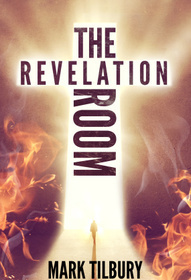 Cover of The Revelation RoomTell us about your forthcoming book, The Revelation Room.
Cover of The Revelation RoomTell us about your forthcoming book, The Revelation Room.
The Revelation Room is the first in a series of psychological mystery thrillers written with a touch of dark humour. Ben Whittle, the protagonist, works in the office of his father’s private investigation business. When Ben receives a terrifying call from his father requesting help after being taken captive by a cult, Ben is forced to act to rescue him. With his friend, Maddie, Ben joins the cult in a last ditch attempt to save his father.
The leader of the cult, Edward Ebb, is a psychopathic egocentric who uses his position to control his small group of followers in The Sons and Daughters of Salvation. When he initiates Ben and Maddie into the group, it soon becomes apparent how sick and twisted Ebb is, and how he tricks and coerces his followers into believing they have no choice other than to follow his barbaric regime.
Ben and Maddie must find Ben’s father and escape from the cult, but the odds are stacked against them and time is running out.
What drew you to that particular genre?
I love exploring the dark side of humanity. I get a thrill from inventing a character who is doing something so bad, so terrifying, that he/she beggars belief, and then figuring out what motivates them. I’m also fascinated by people who just vanish off the face of the earth. Where have they gone? Why? I like to imagine what has happened to them, particularly if the person has gone missing in mysterious circumstances. There are some extremely bizarre disappearances out there which can get the creative juices flowing.
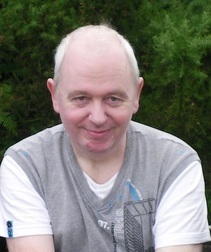 Novelist Mark TilburyAs a new novelist, what challenges did you face during the writing process?
Novelist Mark TilburyAs a new novelist, what challenges did you face during the writing process?
Taking that leap of faith to do it, especially with social media, because I didn’t have a clue. I’d never been on Twitter or Facebook before, and I’d never even heard of Goodreads or Pinterest. It was only with the fantastic help of my girlfriend and a lot of kind and generous people out there who give their time and expertise freely that I realised it was possible, even for someone who’s just getting used to mobile phones! Other than the technicalities of the modern world, I found the editing process an enlightening experience. I tend to write with a loose idea of where the story is going, and that can prove to be both a blessing and a curse. A blessing in the sense that I can sometimes surprise myself (in a good way), and a curse because there’s quite a lot of stuff to put right when the dust settles. I’m still trying to strike the right balance. I would describe myself as a ‘plantser’ – somewhere between a planner and a pantser.
Have you always wanted to write fiction? Before The Revelation Room, had you written anything?
I’ve always written since I can remember. I don’t even think it’s a matter of whether I want to write or not; I feel compelled to do it. Poems, short stories, novels, daft little phrases that float into my head without warning. I’ve had long periods where I’ve not written anything, almost convinced myself to do something else, and then I’d wake up with another idea and off I’d go. Even when I was serving on submarines many years ago I’d be scribbling away in a dark corner somewhere and guarding it with my life! I’ve had a short story published in Best magazine and a novel that an agent expressed an interest in, but to be honest, I soon realised I was going around in circles with agents and publishers. It was the emergence of Amazon Kindle and the opportunities for self-publishing that motivated me to try a different path.
 Oxford City Centre. The Revelation Room is set in and around Oxford.How much of yourself did you put into The Revelation Room? Personal views, experiences, those kinds of things?
Oxford City Centre. The Revelation Room is set in and around Oxford.How much of yourself did you put into The Revelation Room? Personal views, experiences, those kinds of things?
There are some of my thoughts on religion in The Revelation Room. I went to a Pentecostal church when I was a kid, and that influenced my way of thinking about religion in a positive way. Even though it was many years ago, those images have stayed with me. As for the darker side of religion, you only have to look at the news to see that in all its glory. Edward Ebb, the antagonist in The Revelation Room, is an example of evil masquerading as a man of God. It fascinates me how people can be manipulated and coerced into doing anything if the conditions are right.
When can we expect the next novel in the series?
I’ve written the first draft and I’m hoping to publish it later this year or early next year. It depends on how much needs doing to it to lick it into shape. I’m also trying to move house and relocate to the Lake District, so it’s quite a hectic time at the moment.
Are you drawn to writing in other genres? If so, which ones?
Stephen King has inspired me a lot, and I like horror stories as long as they have a plausible plot. By that, I mean I don’t like heads flying off and blood everywhere for the sake of it. Misery is my favourite book of all time, and Annie Wilkes one of my favourite characters. I have the plot for a horror story kicking about in my head, so maybe one day. It’s one of those ideas that doesn’t seem to want to go away, which is quite a good sign for me.
 The great Stephen KingWho are your favourite authors, and to what extent have they influenced you?
The great Stephen KingWho are your favourite authors, and to what extent have they influenced you?
I like lots of authors, so it’s hard to say who’s influenced me the most. I think I take something away from every good book I read. Anyway, I’ll try to narrow it down to a few. I must start with Agatha Christie because she was my first love. I read all her books when I was still at school. She lived about a mile away from me in this huge house and we used to go carol singing there at Christmas when we were kids hoping to see her. We never did, but I used to think it was really cool that such a great writer actually lived there.
Catherine Cookson is an absolute legend. She brought to life a period and a part of England with such vivid realism. She created characters I cared about, characters that moved me and made me feel involved in the story. I love the way her dialogue flows and the way her stories make you forget that you are reading because you are so engrossed in the story.
Tom Sharpe is the absolute king of farce. He was the first writer that almost killed me with laughter! I once tried to read a passage from one of his books to my girlfriend and I was laughing so much I couldn’t breathe. Most people will be familiar with Wilt, but his portrayal of the South African police in Indecent Exposure is scathing and brilliant. His superb brand of humour definitely impacted me, and even though I write dark tales, I try to inject some humour into them to lighten them up.
Stephen King has also been a massive influence. I’d advise anyone who wants to write to study his books. He is the best. I love the way his characters instantly come to life. Under the Dome has a huge cast, but every character is written vividly and with wit. I didn’t like the television adaptation, but the novel was nine hundred or so pages of fictional heaven for me.
 Stunning OxfordWhat advice would you give to other wannabe and newbie novelists?
Stunning OxfordWhat advice would you give to other wannabe and newbie novelists?
To write what you are comfortable with and to explore all the avenues of social media. I can’t emphasise the social media bit enough. There are so many tools out there to help you and opportunities which never existed when I started writing. And there are a lot of good people out there who are at hand to help. I have to admit, the generosity of other people has surprised me, and I am so grateful to all those who have helped me. Be prepared to work hard, listen to invaluable advice and keep learning. Always keep learning.
Finally, tell us a little about Mark Tilbury. When you’re not writing, what fires you up? How do you spend your time?
I’m pretty obsessed with playing the guitar. For years I used to strum along to records and play a bit of rhythm. And then I heard a blues artist called Stevie Ray Vaughan, and he made me realise that there’s playing and then there’s playing. I’m trying to learn to play guitar like him, but to be honest, I’m about a million miles away. I also love reading and have a list of so many books that I want to read and re-read in certain cases. Football is another passion, but my team, Reading, are having a pretty bad time of it in the league at the moment. They had a great cup run though, so it’s not all bad.
Thank you, Mark, and I wish you every success with The Revelation Room!
You can purchase The Revelation Room from Amazon via this link. To find out more about Mark, visit his website and blog. Or connect with him on Twitter, Google Plus, Goodreads andPinterest.
Questions for Mark? Post a comment for him!
Enjoyed this post? Please share via the links below:
Why not subscribe to my blog?
 If you've enjoyed this blog post, how about subscribing via RSS feed or email? Either click the links in my blog sidebar or sign up via Networked Blogs, also in the sidebar. It'll be great to have you on board!
If you've enjoyed this blog post, how about subscribing via RSS feed or email? Either click the links in my blog sidebar or sign up via Networked Blogs, also in the sidebar. It'll be great to have you on board!
Want early bird discounts on my future releases, as well as information about special promotions and giveaways? Simply enter your details in the form here, or at the top of the sidebar. I respect your privacy and will never sell your details to any third parties.
Today I'd like to welcome novelist Mark Tilbury to my blog. Mark has recently published his first novel, The Revelation Room. Congratulations, Mark! I really enjoyed reading your book.
I thought my readers would be interested in hearing from someone who's new to the wonderful world of novel-writing. Let the interview begin!
 Cover of The Revelation RoomTell us about your forthcoming book, The Revelation Room.
Cover of The Revelation RoomTell us about your forthcoming book, The Revelation Room.The Revelation Room is the first in a series of psychological mystery thrillers written with a touch of dark humour. Ben Whittle, the protagonist, works in the office of his father’s private investigation business. When Ben receives a terrifying call from his father requesting help after being taken captive by a cult, Ben is forced to act to rescue him. With his friend, Maddie, Ben joins the cult in a last ditch attempt to save his father.
The leader of the cult, Edward Ebb, is a psychopathic egocentric who uses his position to control his small group of followers in The Sons and Daughters of Salvation. When he initiates Ben and Maddie into the group, it soon becomes apparent how sick and twisted Ebb is, and how he tricks and coerces his followers into believing they have no choice other than to follow his barbaric regime.
Ben and Maddie must find Ben’s father and escape from the cult, but the odds are stacked against them and time is running out.
What drew you to that particular genre?
I love exploring the dark side of humanity. I get a thrill from inventing a character who is doing something so bad, so terrifying, that he/she beggars belief, and then figuring out what motivates them. I’m also fascinated by people who just vanish off the face of the earth. Where have they gone? Why? I like to imagine what has happened to them, particularly if the person has gone missing in mysterious circumstances. There are some extremely bizarre disappearances out there which can get the creative juices flowing.
 Novelist Mark TilburyAs a new novelist, what challenges did you face during the writing process?
Novelist Mark TilburyAs a new novelist, what challenges did you face during the writing process?Taking that leap of faith to do it, especially with social media, because I didn’t have a clue. I’d never been on Twitter or Facebook before, and I’d never even heard of Goodreads or Pinterest. It was only with the fantastic help of my girlfriend and a lot of kind and generous people out there who give their time and expertise freely that I realised it was possible, even for someone who’s just getting used to mobile phones! Other than the technicalities of the modern world, I found the editing process an enlightening experience. I tend to write with a loose idea of where the story is going, and that can prove to be both a blessing and a curse. A blessing in the sense that I can sometimes surprise myself (in a good way), and a curse because there’s quite a lot of stuff to put right when the dust settles. I’m still trying to strike the right balance. I would describe myself as a ‘plantser’ – somewhere between a planner and a pantser.
Have you always wanted to write fiction? Before The Revelation Room, had you written anything?
I’ve always written since I can remember. I don’t even think it’s a matter of whether I want to write or not; I feel compelled to do it. Poems, short stories, novels, daft little phrases that float into my head without warning. I’ve had long periods where I’ve not written anything, almost convinced myself to do something else, and then I’d wake up with another idea and off I’d go. Even when I was serving on submarines many years ago I’d be scribbling away in a dark corner somewhere and guarding it with my life! I’ve had a short story published in Best magazine and a novel that an agent expressed an interest in, but to be honest, I soon realised I was going around in circles with agents and publishers. It was the emergence of Amazon Kindle and the opportunities for self-publishing that motivated me to try a different path.
 Oxford City Centre. The Revelation Room is set in and around Oxford.How much of yourself did you put into The Revelation Room? Personal views, experiences, those kinds of things?
Oxford City Centre. The Revelation Room is set in and around Oxford.How much of yourself did you put into The Revelation Room? Personal views, experiences, those kinds of things?There are some of my thoughts on religion in The Revelation Room. I went to a Pentecostal church when I was a kid, and that influenced my way of thinking about religion in a positive way. Even though it was many years ago, those images have stayed with me. As for the darker side of religion, you only have to look at the news to see that in all its glory. Edward Ebb, the antagonist in The Revelation Room, is an example of evil masquerading as a man of God. It fascinates me how people can be manipulated and coerced into doing anything if the conditions are right.
When can we expect the next novel in the series?
I’ve written the first draft and I’m hoping to publish it later this year or early next year. It depends on how much needs doing to it to lick it into shape. I’m also trying to move house and relocate to the Lake District, so it’s quite a hectic time at the moment.
Are you drawn to writing in other genres? If so, which ones?
Stephen King has inspired me a lot, and I like horror stories as long as they have a plausible plot. By that, I mean I don’t like heads flying off and blood everywhere for the sake of it. Misery is my favourite book of all time, and Annie Wilkes one of my favourite characters. I have the plot for a horror story kicking about in my head, so maybe one day. It’s one of those ideas that doesn’t seem to want to go away, which is quite a good sign for me.
 The great Stephen KingWho are your favourite authors, and to what extent have they influenced you?
The great Stephen KingWho are your favourite authors, and to what extent have they influenced you?I like lots of authors, so it’s hard to say who’s influenced me the most. I think I take something away from every good book I read. Anyway, I’ll try to narrow it down to a few. I must start with Agatha Christie because she was my first love. I read all her books when I was still at school. She lived about a mile away from me in this huge house and we used to go carol singing there at Christmas when we were kids hoping to see her. We never did, but I used to think it was really cool that such a great writer actually lived there.
Catherine Cookson is an absolute legend. She brought to life a period and a part of England with such vivid realism. She created characters I cared about, characters that moved me and made me feel involved in the story. I love the way her dialogue flows and the way her stories make you forget that you are reading because you are so engrossed in the story.
Tom Sharpe is the absolute king of farce. He was the first writer that almost killed me with laughter! I once tried to read a passage from one of his books to my girlfriend and I was laughing so much I couldn’t breathe. Most people will be familiar with Wilt, but his portrayal of the South African police in Indecent Exposure is scathing and brilliant. His superb brand of humour definitely impacted me, and even though I write dark tales, I try to inject some humour into them to lighten them up.
Stephen King has also been a massive influence. I’d advise anyone who wants to write to study his books. He is the best. I love the way his characters instantly come to life. Under the Dome has a huge cast, but every character is written vividly and with wit. I didn’t like the television adaptation, but the novel was nine hundred or so pages of fictional heaven for me.
 Stunning OxfordWhat advice would you give to other wannabe and newbie novelists?
Stunning OxfordWhat advice would you give to other wannabe and newbie novelists?To write what you are comfortable with and to explore all the avenues of social media. I can’t emphasise the social media bit enough. There are so many tools out there to help you and opportunities which never existed when I started writing. And there are a lot of good people out there who are at hand to help. I have to admit, the generosity of other people has surprised me, and I am so grateful to all those who have helped me. Be prepared to work hard, listen to invaluable advice and keep learning. Always keep learning.
Finally, tell us a little about Mark Tilbury. When you’re not writing, what fires you up? How do you spend your time?
I’m pretty obsessed with playing the guitar. For years I used to strum along to records and play a bit of rhythm. And then I heard a blues artist called Stevie Ray Vaughan, and he made me realise that there’s playing and then there’s playing. I’m trying to learn to play guitar like him, but to be honest, I’m about a million miles away. I also love reading and have a list of so many books that I want to read and re-read in certain cases. Football is another passion, but my team, Reading, are having a pretty bad time of it in the league at the moment. They had a great cup run though, so it’s not all bad.
Thank you, Mark, and I wish you every success with The Revelation Room!
You can purchase The Revelation Room from Amazon via this link. To find out more about Mark, visit his website and blog. Or connect with him on Twitter, Google Plus, Goodreads andPinterest.
Questions for Mark? Post a comment for him!
Enjoyed this post? Please share via the links below:
Why not subscribe to my blog?
 If you've enjoyed this blog post, how about subscribing via RSS feed or email? Either click the links in my blog sidebar or sign up via Networked Blogs, also in the sidebar. It'll be great to have you on board!
If you've enjoyed this blog post, how about subscribing via RSS feed or email? Either click the links in my blog sidebar or sign up via Networked Blogs, also in the sidebar. It'll be great to have you on board!Want early bird discounts on my future releases, as well as information about special promotions and giveaways? Simply enter your details in the form here, or at the top of the sidebar. I respect your privacy and will never sell your details to any third parties.
Published on May 06, 2015 00:08



